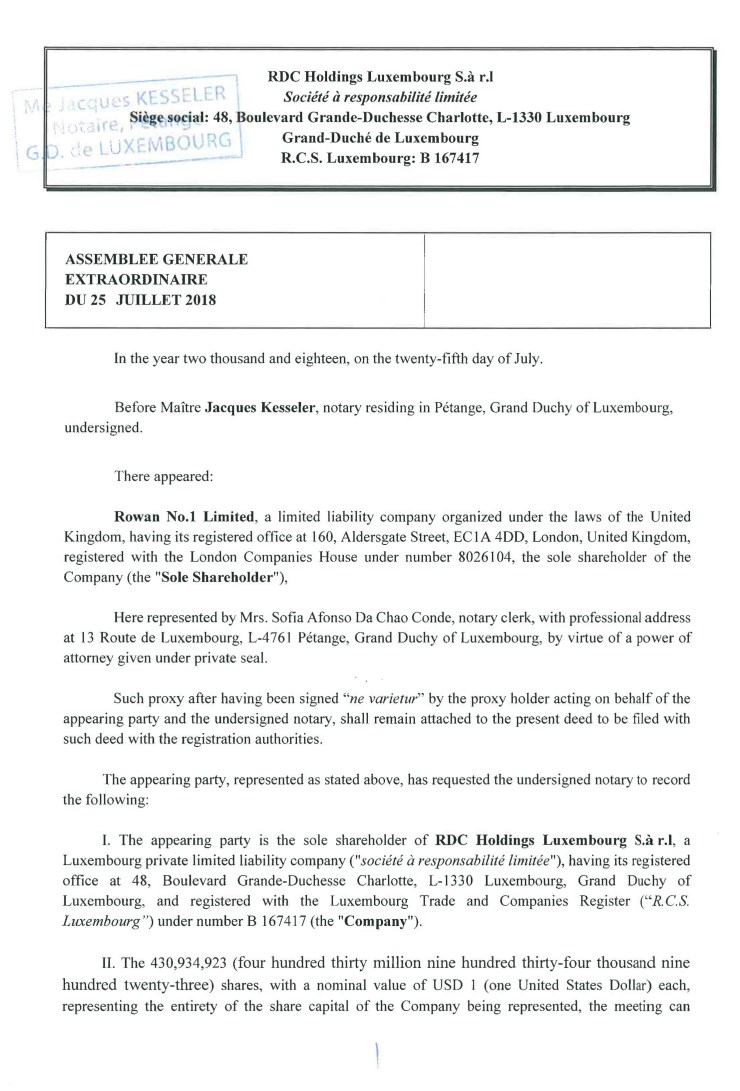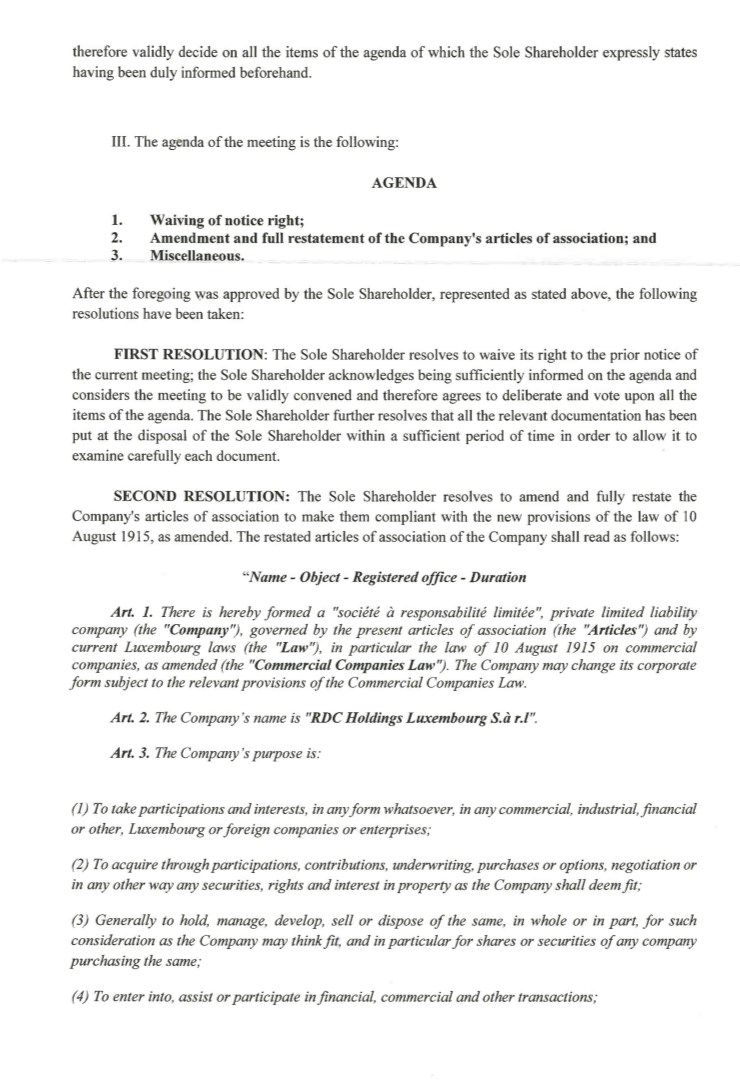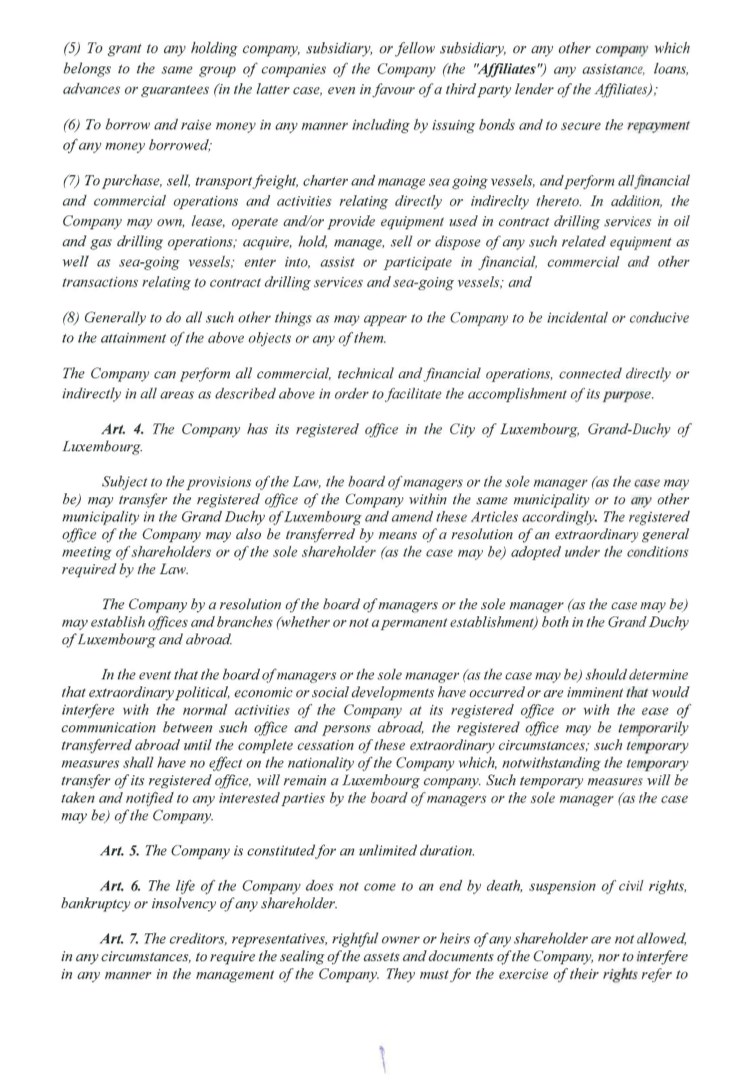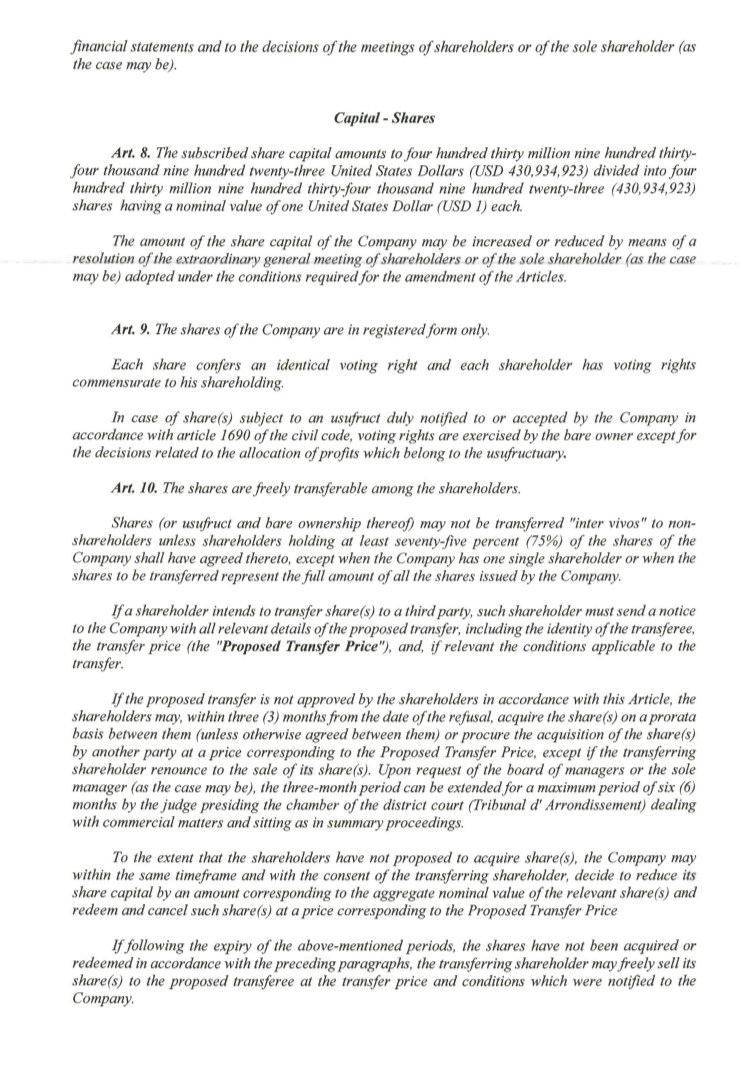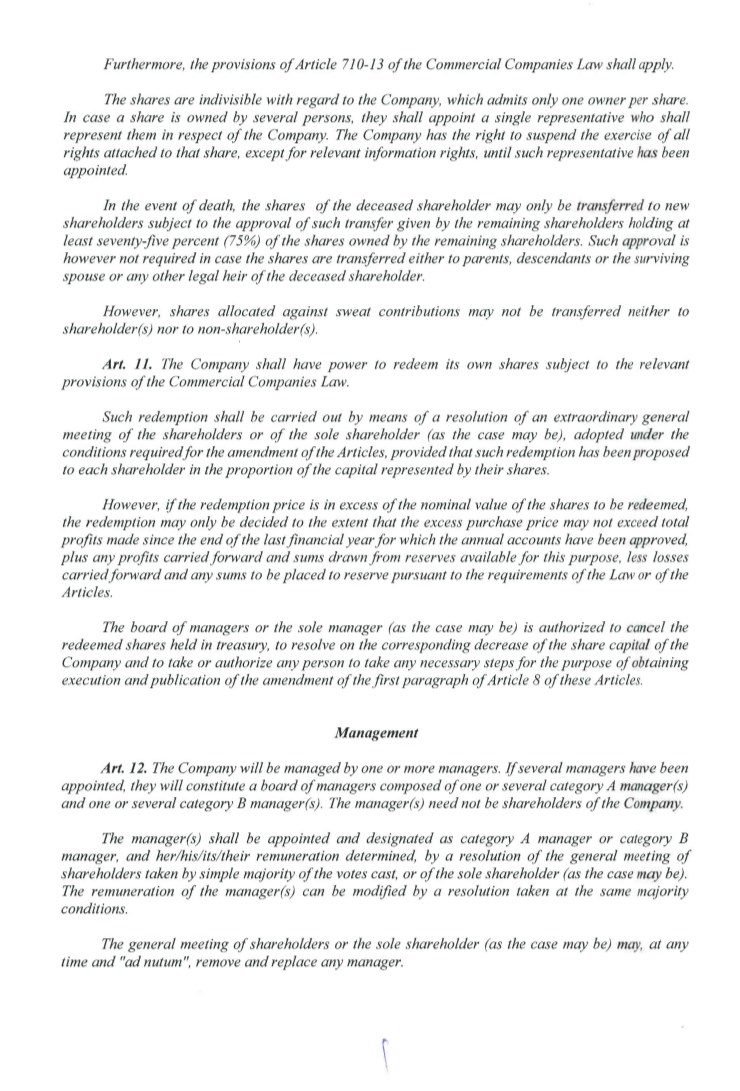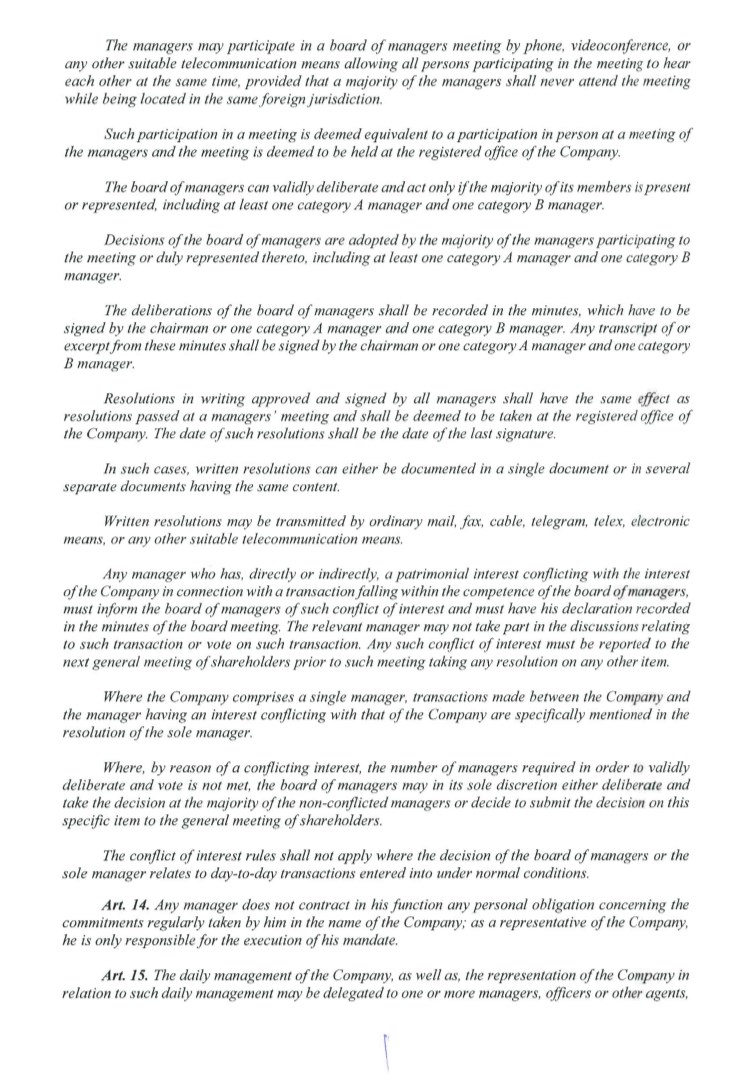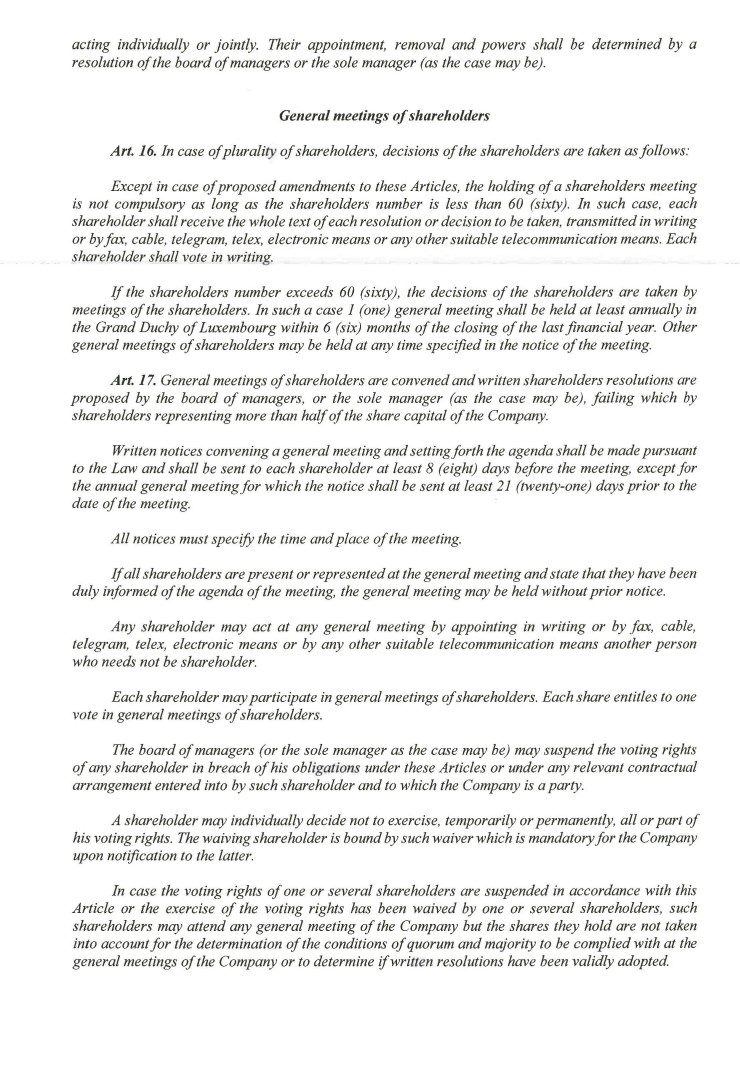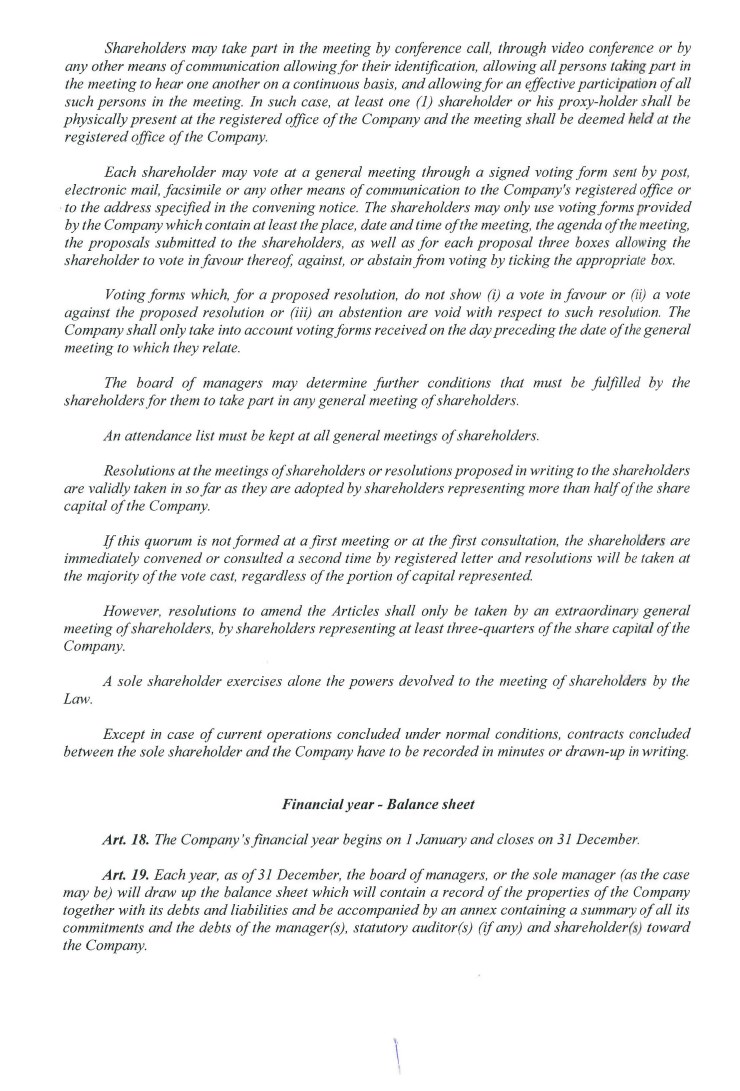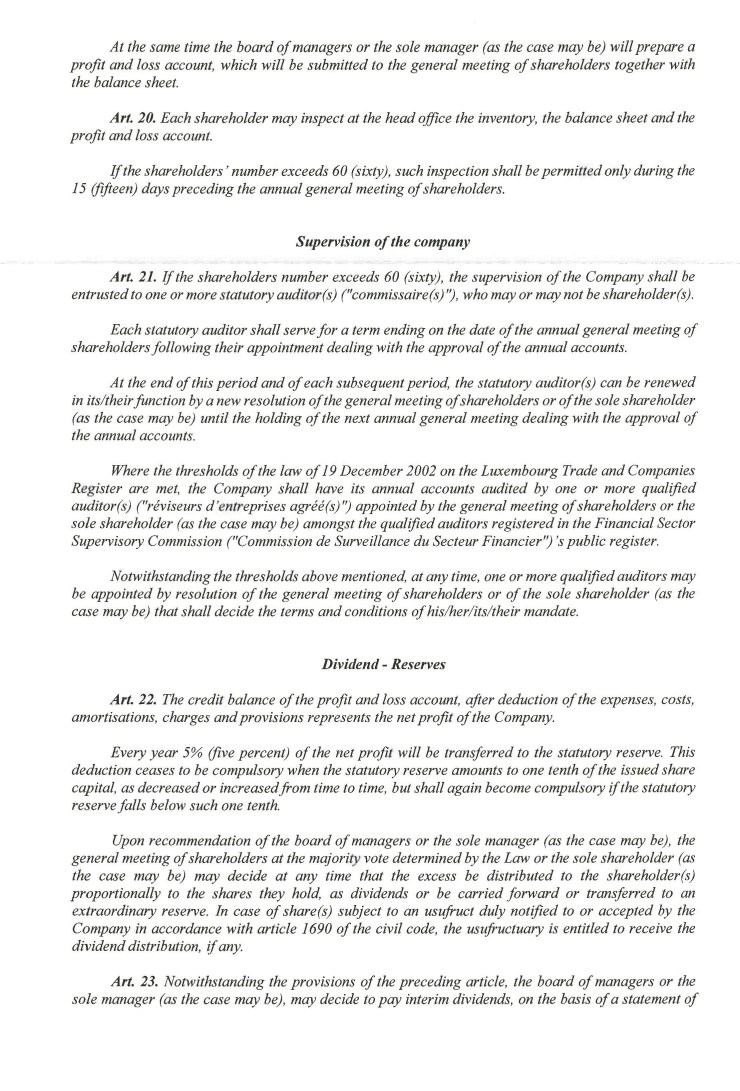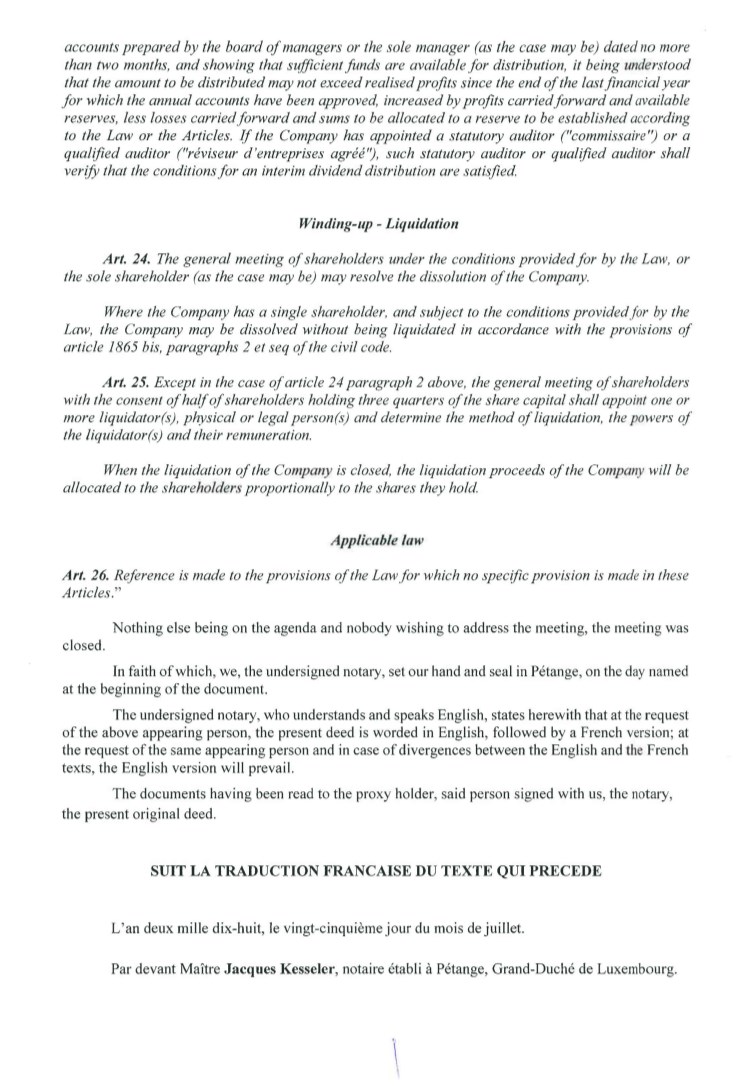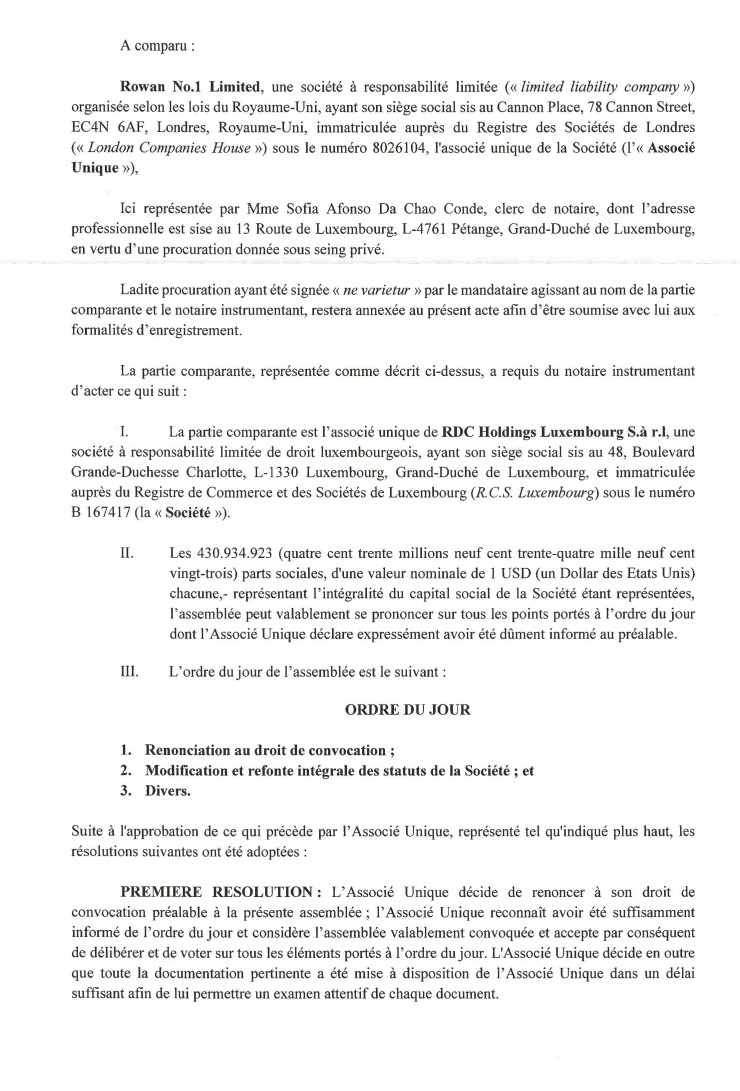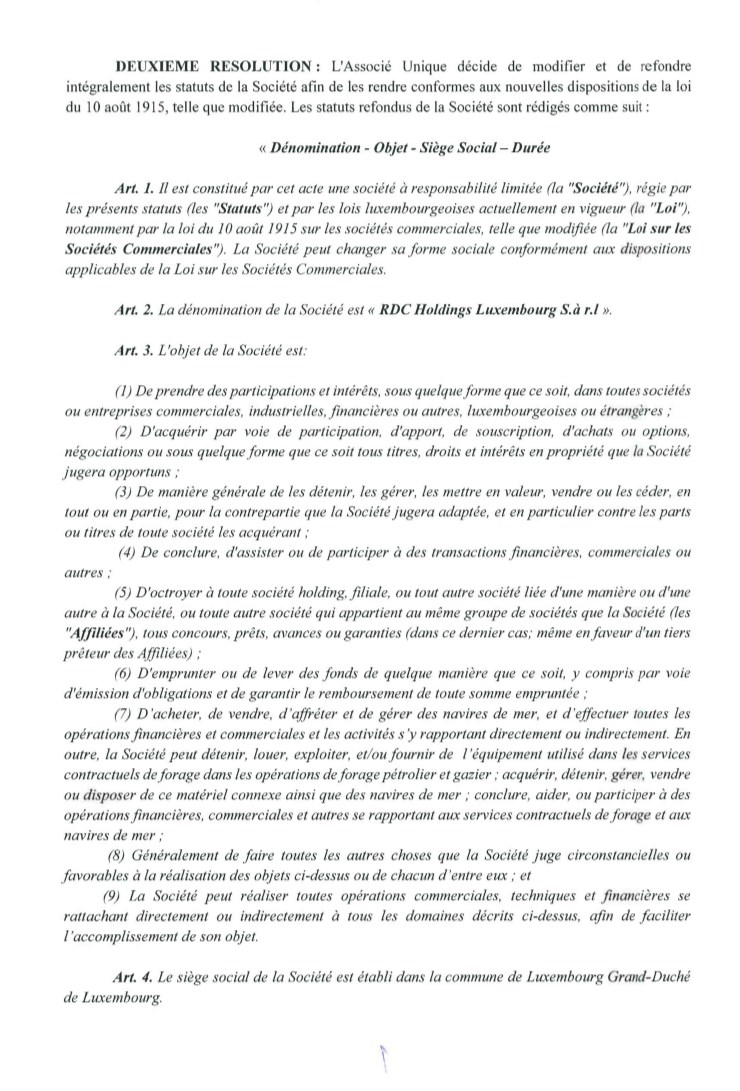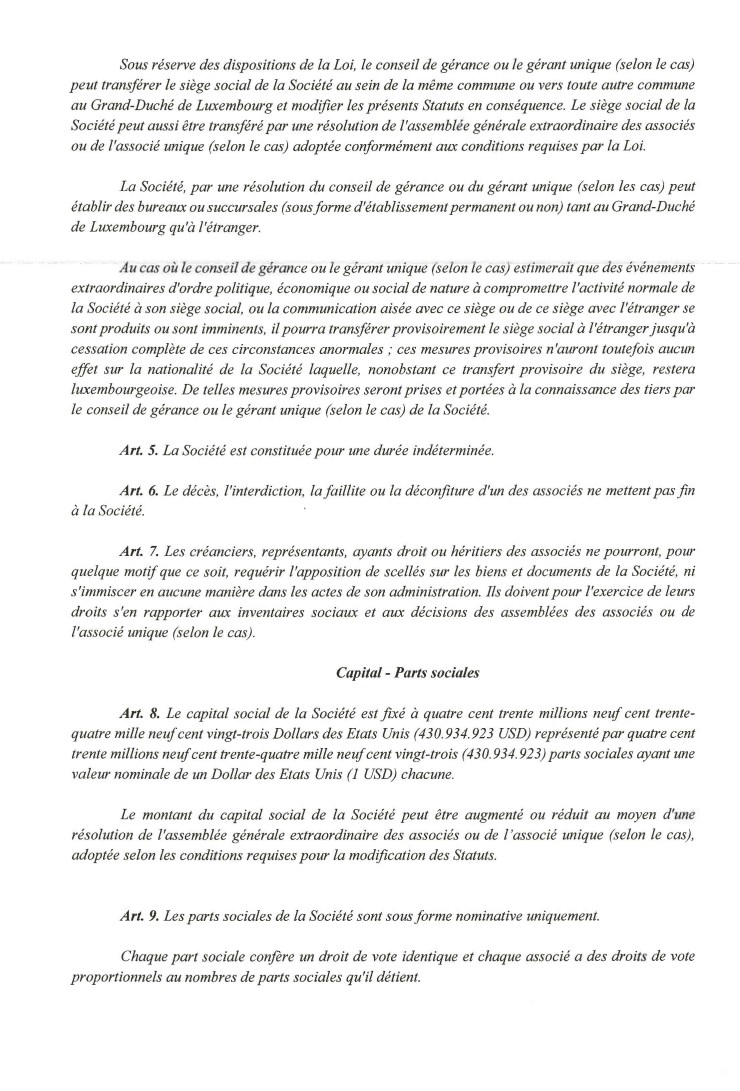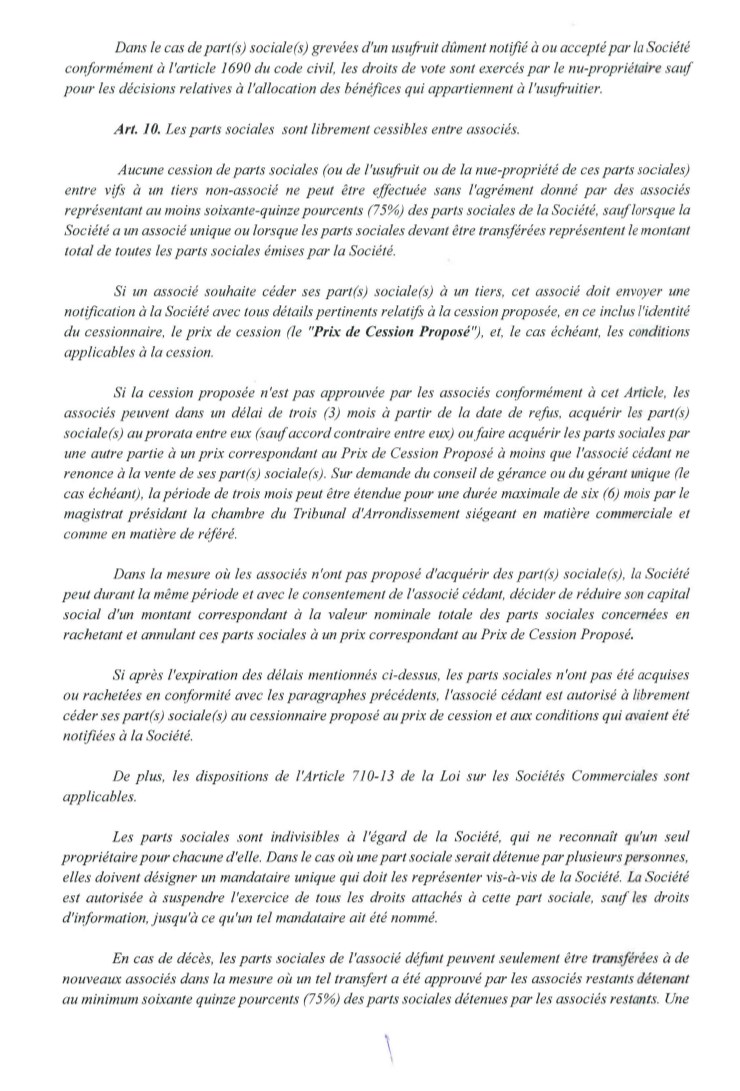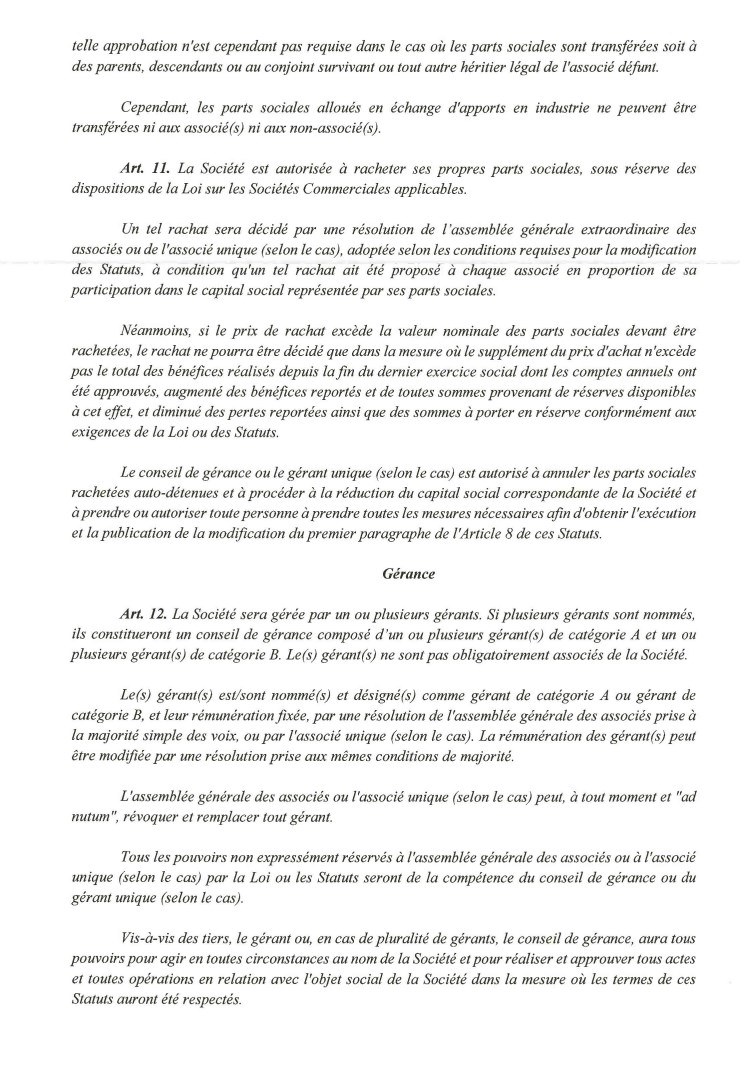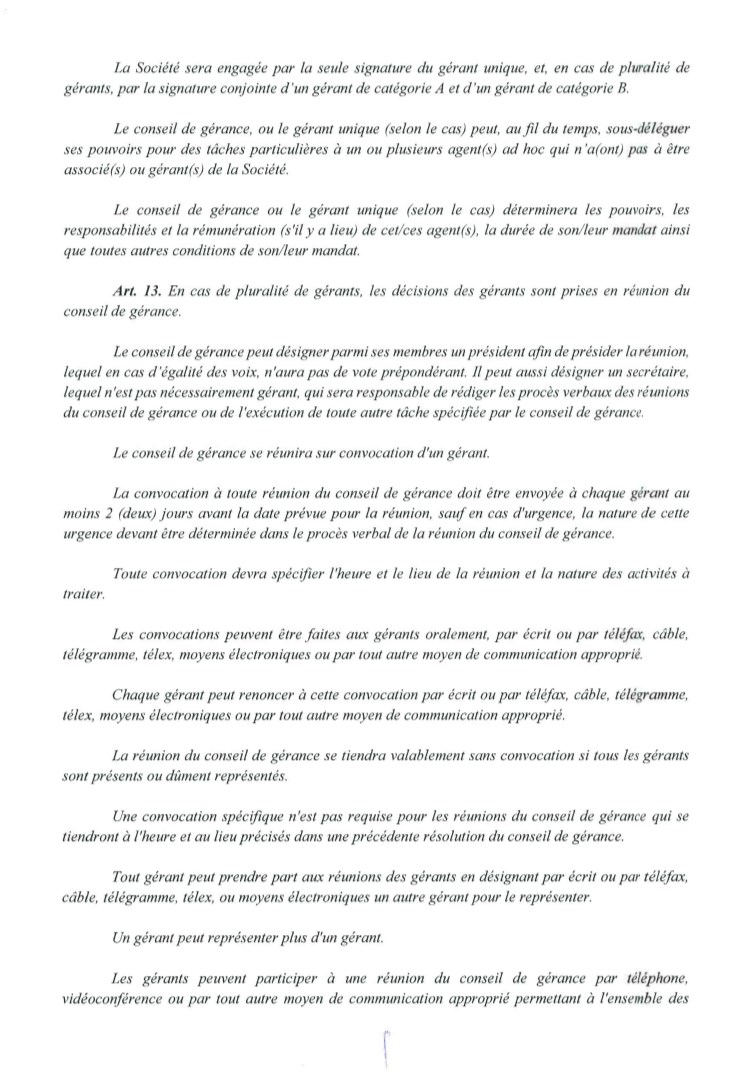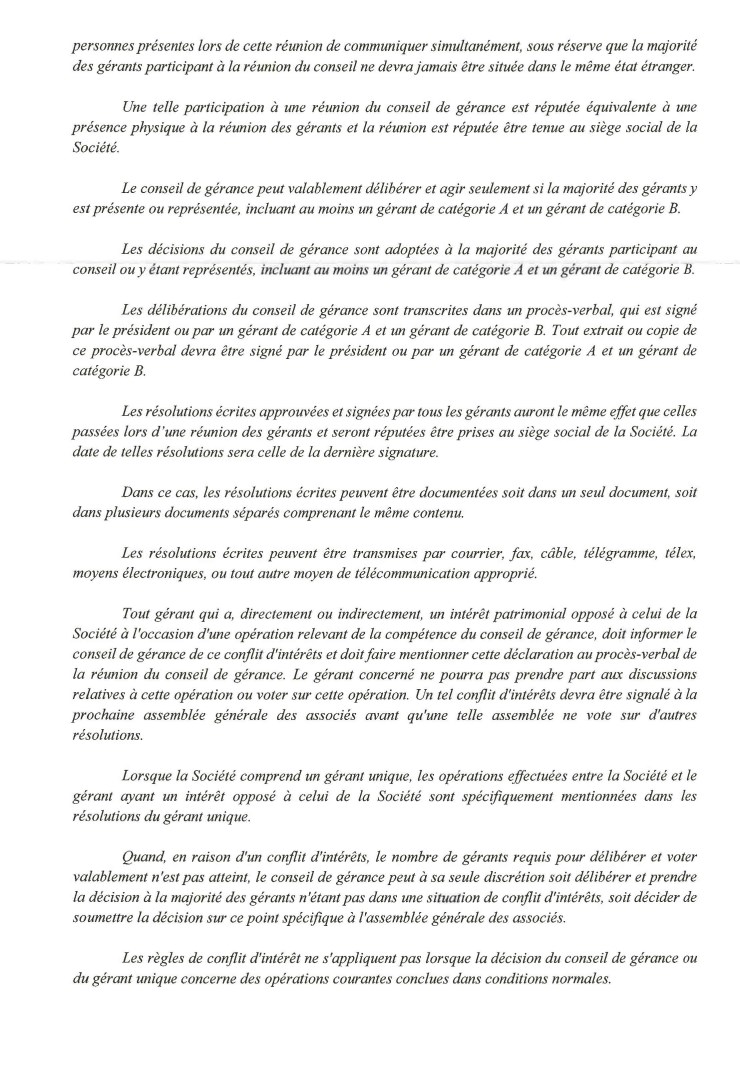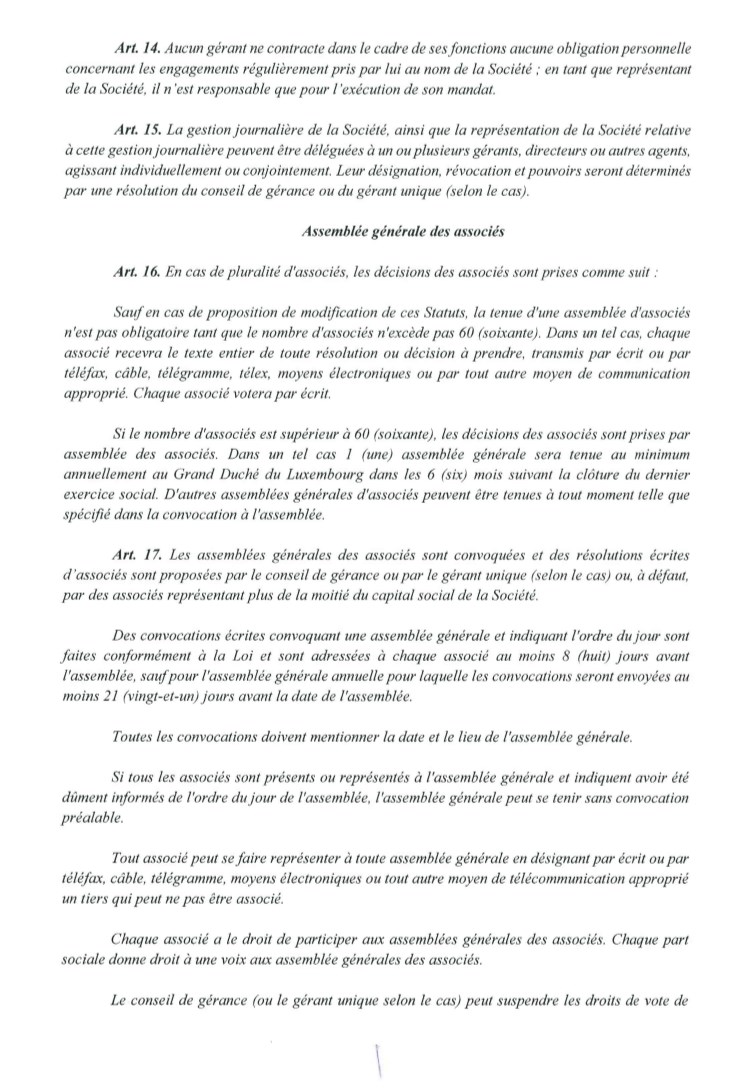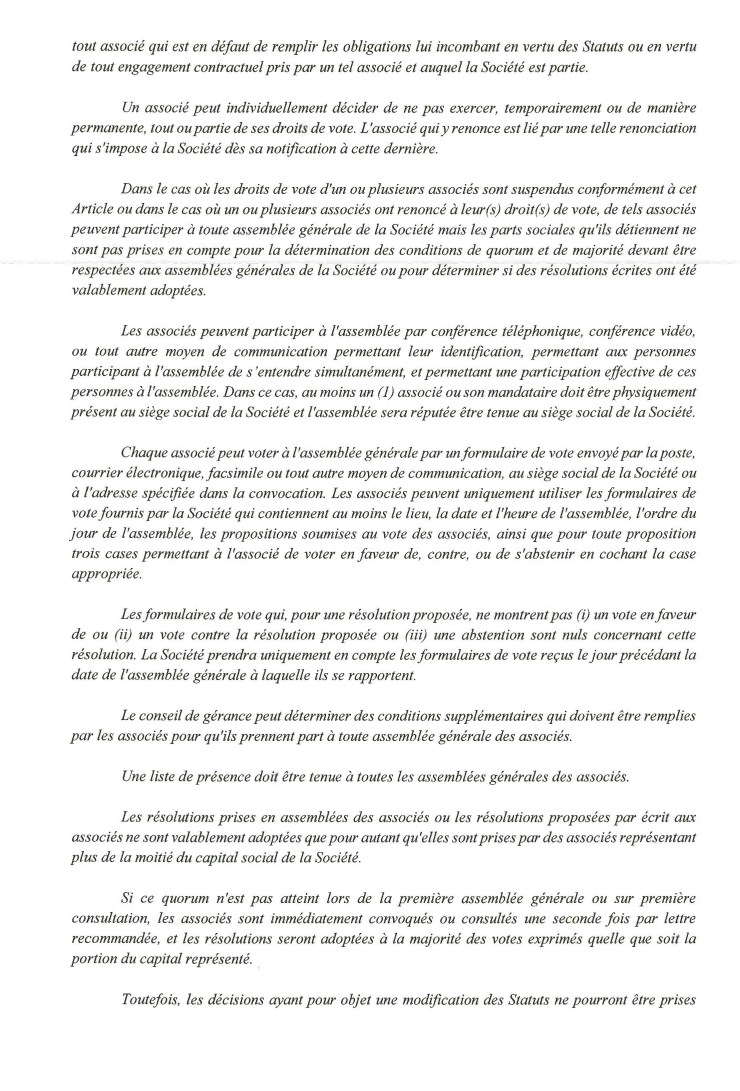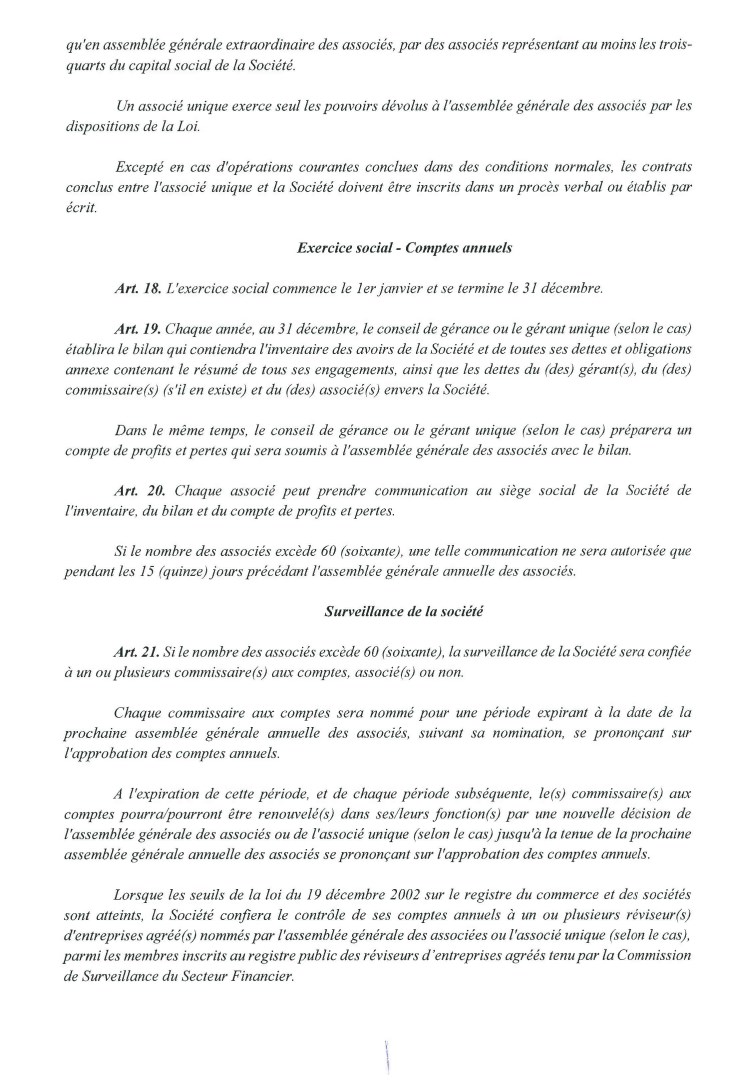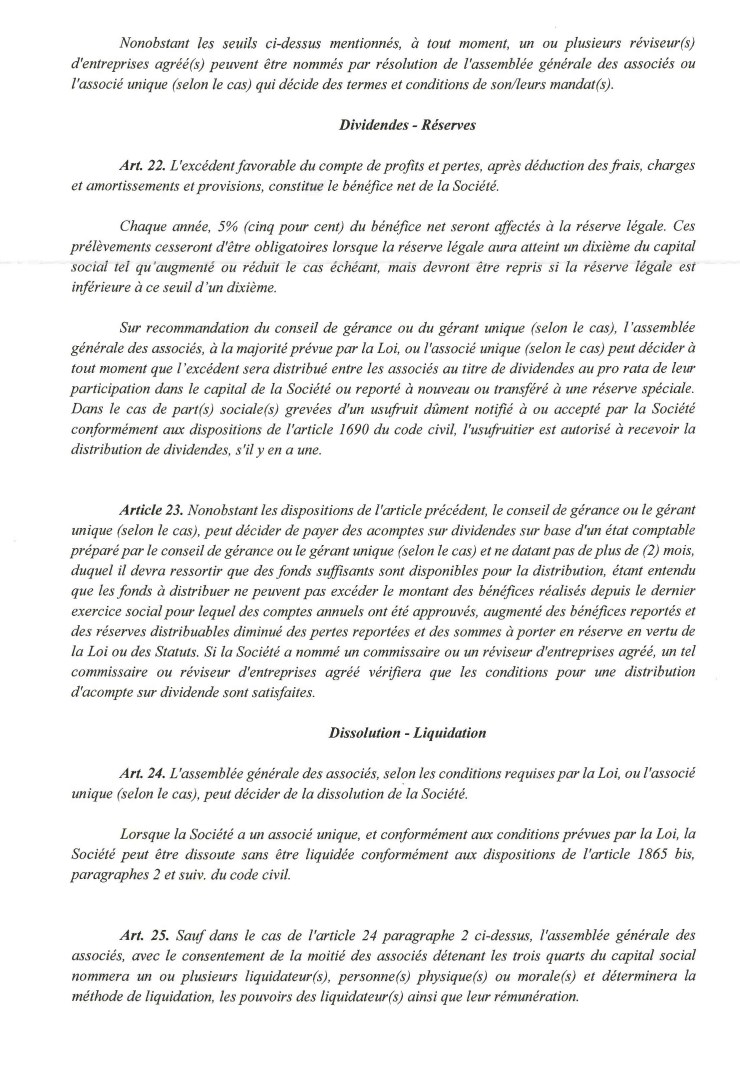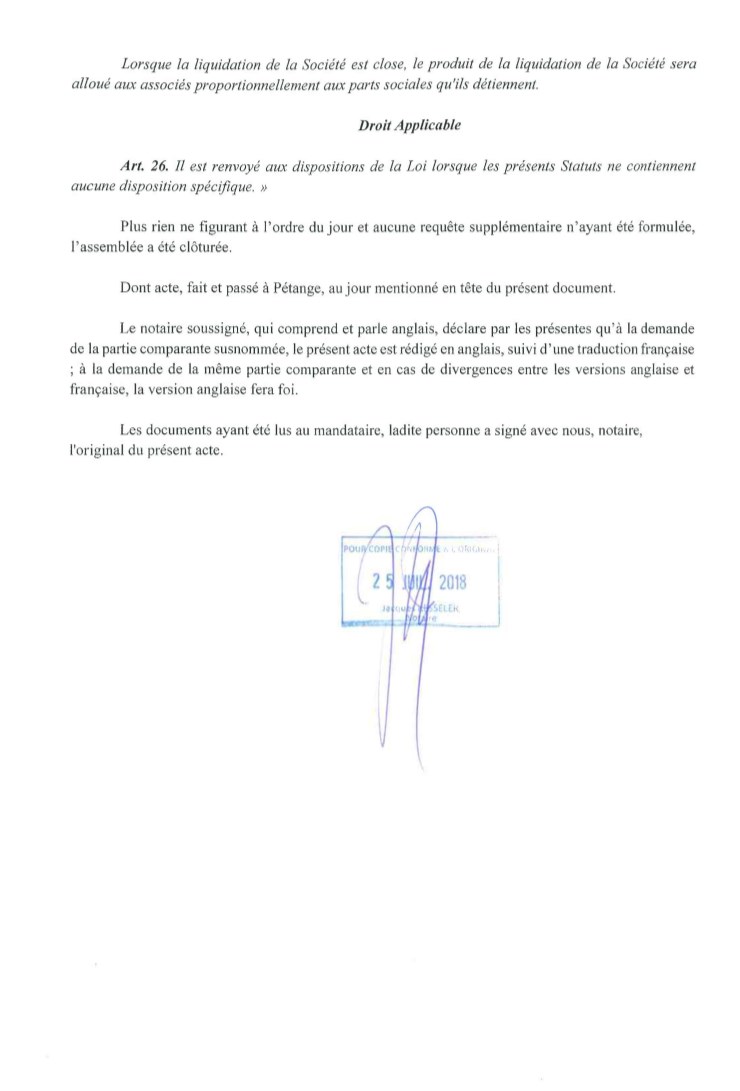Exhibit 3.199
| --7 --rr" r-r Societe a responsabilite limitee RDC Holdings Luxembourg S.a r.l ;'-.:' ' '. ' c .. ,' • : • :i-_ . I Sieg so.cial: 48, Boulevard Grande-Duchesse Charlotte, L-1330 Luxembourg I ,u -:J Grand-Duche de Luxembourg R.C.S. Luxembourg: B 167417 I I l., ASSEMBLEE GENERALE EXTRAORDINAIRE DU 25 JUILLET 2018 In the year two thousand and eighteen, on the twenty-fifth day of July. Before Maitre Jacques Kesseler, notary residing in Petange, Grand Duchy of Luxembourg, undersigned. There appeared: Rowan No.1 Limited, a limited liability company organized under the laws of the United Kingdom, having its registered office at 160, Aldersgate Street, EClA 4OD, London, United Kingdom, registered with the London Companies House under number 8026104, the sole shareholder of the Company (the "Sole Shareholder"), Here represented by Mrs. Sofia Afonso Da Chao Conde, notary clerk, with professional address at 13 Route de Luxembourg, L-4761 Petange, Grand Duchy of Luxembourg, by virtue of a power of attorney given under private seal. Such proxy after having been signed "ne varietur" by the proxy holder acting on behalf of the appearing party and the undersigned notary, shall remain attached to the present deed to be filed with such deed with the registration authorities. The appearing party, represented as stated above, has requested the undersigned notary to record the following: I. The appearing party is the sole shareholder of RDC Holdings Luxembourg S.a r.l, a Luxembourg private limited liability company ("societe a responsabilite limitee"), having its registered office at 48, Boulevard Grande-Duchesse Charlotte, L-13 3 0 Luxembourg, Grand Duchy of Luxembourg, and registered with the Luxembourg Trade and Companies Register ("R.C.S. Luxembourg") under number B 167417 (the "Company"). II. The 430,934,923 (four hundred thirty million nine hundred thirty-four thousand nine hundred twenty-three) shares, with a nominal value of USO 1 (one United States Dollar) each, representing the entirety of the share capital of the Company being represented, the meeting can |
| therefore validly decide on all the items of the agenda of which the Sole Shareholder expressly states having been duly informed beforehand. III. The agenda of the meeting is the following: AGENDA 1. Waiving of notice right; 2. Amendment and full restatement of the Company's articles of association; and 3. Miscellaneous. After the foregoing was approved by the Sole Shareholder, represented as stated above, the following resolutions have been taken: FIRST RESOLUTION: The Sole Shareholder resolves to waive its right to the prior notice of the current meeting; the Sole Shareholder acknowledges being sufficiently informed on the agenda and considers the meeting to be validly convened and therefore agrees to deliberate and vote upon all the items of the agenda. The Sole Shareholder further resolves that all the relevant documentation has been put at the disposal of the Sole Shareholder within a sufficient period of time in order to allow it to examine carefully each document. SECOND RESOLUTION: The Sole Shareholder resolves to amend and fully restate the Company's articles of association to make them compliant with the new provisions of the law of I 0 August 1915, as amended. The restated articles of association of the Company shall read as follows: "Name - Object - Registered office - Duration Art. 1. There is hereby formed a "societe a responsabilite limitee", private limited liability company (the "Company''), governed by the present articles of association (the ''Articles'') and by current Luxembourg laws (the "Law''), in particular the law of JO August 1915 on commercial companies, as amended (the "Commercial Companies Law''). The Company may change its corporate form subject to the relevant provisions of the Commercial Companies Law. Art. 2. The Company's name is "RDC Holdings Luxembourg S.a r.l". Art. 3. The Company's purpose is: (]) To take participations and interests, in any form whatsoever, in any commercial, industrial,.financial or other, Luxembourg or foreign companies or enterprises; (2) To acquire through participations, contributions, underwriting, purchases or options, negotiation or in any other way any securities, rights and interest in property as the Company shall deem fit; (3) Generally to hold, manage, develop, sell or dispose of the same, in whole or in part, for such consideration as the Company may think fit, and in particular for shares or securities of any company purchasing the same; (4) To enter into, assist or participate in.financial, commercial and other transactions; |
| (5) To grant to any holding company, subsidiary, or fellow subsidiary, or any other company which belongs to the same group of companies of the Company (the ''Affiliates'') any assistance, loans, advances or guarantees (in the latter case, even in favour of a third party lender of the Affiliates); (6) To borrow and raise money in any manner including by issuing bonds and to secure the repayment of any money borrowed; (7) To purchase, sell, transport.freight, charter and manage sea going vessels, and perform al/financial and commercial operations and activities relating directly or indireclty thereto. In addition, the Company may own, lease, operate and/or provide equipment used in contract drilling services in oil and gas drilling operations; acquire, hold, manage, sell or dispose of any such related equipment as well as sea-going vessels; enter into, assist or participate in financial, commercial and other transactions relating to contract drilling services and sea-going vessels; and (8) Generally to do all such other things as may appear to the Company to be incidental or conducive to the attainment of the above objects or any of them. The Company can perform all commercial, technical and financial operations, connected directly or indirectly in all areas as described above in order to facilitate the accomplishment of its purpose. Art. 4. The Company has its registered office in the City of Luxembourg, Grand-Duchy of Luxembourg. Subject to the provisions of the Law, the board of managers or the sole manager (as the case may be) may transfer the registered office of the Company within the same municipality or to any other municipality in the Grand Duchy of Luxembourg and amend these Articles accordingly. The registered office of the Company may also be transferred by means of a resolution of an extraordinary general meeting of shareholders or of the sole shareholder (as the case may be) adopted under the conditions required by the Law. The Company by a resolution of the board of managers or the sole manager (as the case may be) may establish offices and branches (whether or not a permanent establishment) both in the Grand Duchy of Luxembourg and abroad. In the event that the board of managers or the sole manager (as the case may be) should determine that extraordinary political, economic or social developments have occurred or are imminent that would interfere with the normal activities of the Company at its registered office or with the ease of communication between such office and persons abroad, the registered office may be temporarily transferred abroad until the complete cessation of these extraordinary circumstances; such temporary measures shall have no effect on the nationality of the Company which, notwithstanding the temporary transfer of its registered office, will remain a Luxembourg company. Such temporary measures will be taken and notified to any interested parties by the board of managers or the sole manager (as the case may be) of the Company. Art. 5. The Company is constituted for an unlimited duration. Art. 6. The life of the Company does not come to an end by death, suspension of civil rights, bankruptcy or insolvency of any shareholder. Art. 7. The creditors, representatives, rightful owner or heirs of any shareholder are not allowed, in any circumstances, to require the sealing of the assets and documents of the Company, nor to interfere in any manner in the management of the Company. They must for the exercise of their right refer to |
| financial statements and to the decisions of the meetings of shareholders or of the sole shareholder (as the case may be). Capital - Shares Art. 8. The subscribed share capital amounts to four hundred thirty million nine hundred thirty four thousand nine hundred twenty-three United States Dollars (USD 430,934,923) divided into four hundred thirty million nine hundred thirty-four thousand nine hundred twenty-three (430,934,923) shares having a nominal value of one United States Dollar (USD 1) each. The amount of the share capital of the Company may be increased or reduced by means of a res_olution of the ex ,traordinary general meeting of shareholders or of the. sole .shareholder ( as the c£tse may be) adopted under the conditions required for the amendment of the Articles. Art. 9. The shares of the Company are in registered form only. Each share confers an identical voting right and each shareholder has voting rights commensurate to his shareholding. In case of share(s) subject to an usufruct duly notified to or accepted by the Company in accordance with article 1690 of the civil code, voting rights are exercised by the bare owner except for the decisions related to the allocation of profits which belong to the usufructuary. Art. 10. The shares are freely transferable among the shareholders. Shares (or usufruct and bare ownership thereof) may not be transferred "inter vivas" to non shareholders unless shareholders holding at least seventy-jive percent (75%) of the shares of the Company shall have agreed thereto, except when the Company has one single shareholder or when the shares to be transferred represent the full amount of all the shares issued by the Company. If a shareholder intends to transfer share(s) to a third party, such shareholder must send a notice to the Company with all relevant details of the proposed transfer, including the identity of the transferee, the transfer price (the "Proposed Transfer Price''), and, if relevant the conditions applicable to the transfer. If the proposed transfer is not approved by the shareholders in accordance with this Article, the shareholders may, within three (3) months from the date of the refusal, acquire the share(s) on a prorata basis between them (unless otherwise agreed between them) or procure the acquisition of the share(s) by another party at a price corresponding to the Proposed Transfer Price, except if the transferring shareholder renounce to the sale of its share(s). Upon request of the board of managers or the sole manager (as the case may be), the three-month period can be extended for a maximum period of six (6) months by the judge presiding the chamber of the district court (Tribunal d' Arrondissement) dealing with commercial matters and sitting as in summary proceedings. To the extent that the shareholders have not proposed to acquire share(s), the Company may within the same timeframe and with the consent of the transferring shareholder, decide to reduce its share capital by an amount corresponding to the aggregate nominal value of the relevant share(s) and redeem and cancel such share(s) at a price corresponding to the Proposed Transfer Price If following the expiry of the above-mentioned periods, the shares have not been acquired or redeemed in accordance with the preceding paragraphs, the transferring shareholder may freely sell its share(s) to the proposed transferee at the transfer price and conditions which were notified to the Company. |
| Furthermore, the provisions of Article 710-13 of the Commercial Companies Law shall apply. The shares are indivisible with regard to the Company, which admits only one owner per share. In case a share is owned by several persons, they shall appoint a single representative who shall represent them in respect of the Company. The Company has the right to suspend the exercise of all rights attached to that share, except for relevant information rights, until such representative has been appointed. In the event of death, the shares of the deceased shareholder may only be transferred to new shareholders subject to the approval of such transfer given by the remaining shareholders holding at least seventy-five percent (75%) of the shares owned by the remaining shareholders. Such approval is however not required in case the shares are transferred either to parents, descendants or the surviving spouse or any other legal heir of the deceased shareholder. However, shares allocated against sweat contributions may not be transferred neither to shareholder(s) nor to non-shareholder(s). Art. 11. The Company shall have power to redeem its own shares subject to the relevant provisions of the Commercial Companies Law. Such redemption shall be carried out by means of a resolution of an extraordinary general meeting of the shareholders or of the sole shareholder (as the case may be), adopted under the conditions required for the amendment of the Articles, provided that such redemption has been proposed to each shareholder in the proportion of the capital represented by their shares. However, if the redemption price is in excess of the nominal value of the shares to be redeemed, the redemption may only be decided to the extent that the excess purchase price may not exceed total pro.fits made since the end of the last.financial year for which the annual accounts have been approved, plus any pro.fits carried forward and sums drawn from reserves available for this purpose, less losses carried forward and any sums to be placed to reserve pursuant to the requirements of the Law or of the Articles. The board of managers or the sole manager (as the case may be) is authorized to cancel the redeemed shares held in treasury, to resolve on the corresponding decrease of the share capital of the Company and to take or authorize any person to take any necessary steps for the purpose of obtaining execution and publication of the amendment of the first paragraph of Article 8 of these Articles. Management Art. 12. The Company will be managed by one or more managers. Jf several managers have been appointed, they will constitute a board of managers composed of one or several category A manager(s) and one or several category B manager(s). The manager(s) need not be shareholders of the Company. The manager(s) shall be appointed and designated as category A manager or category B manager, and her/his/its/their remuneration determined, by a resolution of the general meeting of shareholders taken by simple majority of the votes cast, or of the sole shareholder (as the case may be). The remuneration of the manager(s) can be modified by a resolution taken at the same majority conditions. The general meeting of shareholders or the sole shareholder (as the case may be) may, at any time and "ad nutum", remove and replace any manager. |
| All powers not expressly reserved by the Law or the Articles to the general meeting of shareholders or to the sole shareholder (as the case may be) fall within the competence of the board of managers, or of the sole manager (as the case may be). In dealing with third parties, the manager, or, in case of plurality of managers, the board of managers will have all powers to act in the name of the Company in all circumstances and to carry out and approve all acts and operations consistent with the Company's object, provided the terms of these Articles shall have been complied with. The Company shall be bound by the sole signature of its single manager, and, in case of plurality of managers, by the joint signature of one category A manager and one category B manager. The board of managers or the sole manager (as the case may be), may from time to time sub delegate her/his/its powers for specific tasks to one or several ad hoc agent(s) who need not be shareholder(s) or manager(s) of the Company. The board of managers, or the sole manager (as the case may be) will determine the powers, duties and remuneration (if any) of its agent(s), the duration of the period of representation and any other relevant conditions of his/their agency. Art. 13. In case of plurality of managers, the decisions of the managers are taken by meeting of the board of managers. The board of managers may appoint among its members a chairman to chair the meeting which, in case of tie vote, shall not have a casting vote. It may also appoint a secretary, who needs not to be a manager, who shall be responsible for keeping the minutes of the meetings of the board of managers or for such other matter as may be specified by the board of managers. The board of managers shall meet when convened by any manager. Notice of any meeting of the board of managers shall be given to all managers at least 2 (two) days in advance of the time set for such meeting except in the event of emergency, the nature of which is to be set forth in the minute of the meeting. Any convening notice shall specify the time and place of the meeting and the nature of the business to be transacted. Convening notices can be given to each manager by word of mouth, in writing or by fax, cable, telegram, telex, electronic means or by any other suitable communication means. The notice may be waived by the consent, in writing or by fax, cable, telegram, telex, electronic means or by any other suitable communication means, of each manager. The meeting will be duly held without prior notice if all the managers are present or duly represented. No separate notice is required for meetings held at times and places specified in a schedule previously adopted by a resolution of the board of managers. Any manager may act at any meeting of the board of managers by appointing in writing or by fax, cable, telegram, telex or electronic means another manager as his/her/its proxy. A manager may represent more than one manager. |
| The managers may participate in a board of managers meeting by phone, videoconference, or any other suitable telecommunication means allowing all persons participating in the meeting to hear each other at the same time, provided that a majority of the managers shall never attend the meeting while being located in the same foreign jurisdiction. Such participation in a meeting is deemed equivalent to a participation in person at a meeting of the managers and the meeting is deemed to be held at the registered office of the Company. The board of managers can validly deliberate and act only if the majority of its members is present or represented, including at least one category A manager and one category B manager. Decisions of the board of managers are adopted by the majority of the managers participating to the meeting or duly represented thereto, including at least one category A manager and one category B manager. The deliberations of the board of managers shall be recorded in the minutes, which have to be signed by the chairman or one category A manager and one category B manager. Any transcript of or excerpt from these minutes shall be signed by the chairman or one category A manager and one category B manager. Resolutions in writing approved and signed by all managers shall have the same e ffect as resolutions passed at a managers ' meeting and shall be deemed to be taken at the registered office of the Company. The date of such resolutions shall be the date of the last signature. In such cases, written resolutions can either be documented in a single document or in several separate documents having the same content. Written resolutions may be transmitted by ordinary mail, fax, cable, telegram, telex, electronic means, or any other suitable telecommunication means. Any manager who has, directly or indirectly, a patrimonial interest conflicting with the interest of the Company in connection with a transaction falling within the competence of the board of managers, must inform the board of managers of such conflict of interest and must have his declaration recorded in the minutes of the board meeting. The relevant manager may not take part in the discussions relating to such transaction or vote on such transaction. Any such conflict of interest must be reported to the next general meeting of shareholders prior to such meeting taking any resolution on any other item. Where the Company comprises a single manager, transactions made between the Company and the manager having an interest conflicting with that of the Company are specifically mentioned in the resolution of the sole manager. Where, by reason of a conflicting interest, the number of managers required in order to validly deliberate and vote is not met, the board of managers may in its sole discretion either deliberate and take the decision at the majority of the non-conflicted managers or decide to submit the decision on this specific item to the general meeting of shareholders. The conflict of interest rules shall not apply where the decision of the board of managers or the sole manager relates to day-to-day transactions entered into under normal conditions. Art. 14. Any manager does not contract in his function any personal obligation concerning the commitments regularly taken by him in the name of the Company,· as a representative of the Company, he is only responsible for the execution of his mandate. Art. 15. The daily management of the Company, as well as, the representation of the Company in relation to such daily management may be delegated to one or more managers, officers or other agents, |
| acting individually or jointly. Their appointment, removal and powers shall be determined by a resolution of the board of managers or the sole manager (as the case may be). General meetings of shareholders Art. 16. In case of plurality of shareholders, decisions of the shareholders are taken as follows: Except in case of proposed amendments to these Articles, the holding of a shareholders meeting is not compulsory as long as the shareholders number is less than 60 (sixty). In such case, each shareholder shall receive the whole text of each resolution or decision to be taken, transmitted in writing or by fax, cable, telegram, telex, electronic means or any other suitable telecommunication means. Each shareholder shall vote in writing. If the shareholders number exceeds 60 (sixty), the decisions of the shareholders are taken by meetings of the shareholders. In such a case 1 (one) general meeting shall be held at least annually in the Grand Duchy of Luxembourg within 6 (six) months of the closing of the last financial year. Other general meetings of shareholders may be held at any time specified in the notice of the meeting. Art. 17. General meetings of shareholders are convened and written shareholders resolutions are proposed by the board of managers, or the sole manager (as the case may be), failing which by shareholders representing more than half of the share capital of the Company. Written notices convening a general meeting and settingforth the agenda shall be made pursuant to the Law and shall be sent to each shareholder at least 8 (eight) days before the meeting, except for the annual general meeting for which the notice shall be sent at least 21 (twenty-one) days prior to the date of the meeting. All notices must specify the time and place of the meeting. If all shareholders are present or represented at the general meeting and state that they have been duly informed of the agenda of the meeting, the general meeting may be held without prior notice. Any shareholder may act at any general meeting by appointing in writing or by fax, cable, telegram, telex, electronic means or by any other suitable telecommunication means another person who needs not be shareholder. Each shareholder may participate in general meetings of shareholders. Each share entitles to one vote in general meetings of shareholders. The board of managers (or the sole manager as the case may be) may suspend the voting rights of any shareholder in breach of his obligations under these Articles or under any relevant contractual arrangement entered into by such shareholder and to which the Company is a party. A shareholder may individually decide not to exercise, temporarily or permanently, all or part of his voting rights. The waiving shareholder is bound by such waiver which is mandatory for the Company upon notification to the latter. In case the voting rights of one or several shareholders are suspended in accordance with this Article or the exercise of the voting rights has been waived by one or several shareholders, such shareholders may attend any general meeting of the Company but the shares they hold are not taken into account for the determination of the conditions of quorum and majority to be complied with at the general meetings of the Company or to determine if written resolutions have been validly adopted. |
| Shareholders may take part in the meeting by conference call, through video conference or by any other means of communication allowing for their identification, allowing all persons taking part in the meeting to hear one another on a continuous basis, and allowing for an effective participation of all such persons in the meeting. In such case, at least one (]) shareholder or his proxy-holder shall be physically present at the registered office of the Company and the meeting shall be deemed held at the registered office of the Company. Each shareholder may vote at a general meeting through a signed voting form sent by post, electronic mail, facsimile or any other means of communication to the Company's registered office or · to the address specified in the convening notice. The shareholders may only use voting forms provided by the Company which contain at least the place, date and time of the meeting, the agenda of the meeting, the proposals submitted to the shareholders, as well as for each proposal three boxes allowing the shareholder to vote in favour thereof, against, or abstain from voting by ticking the appropriate box. Voting forms which, for a proposed resolution, do not show (i) a vote in favour or (ii) a vote against the proposed resolution or (iii) an abstention are void with respect to such resolution. The Company shall only take into account voting forms received on the day preceding the date of the general meeting to which they relate. The board of managers may determine further conditions that must be fulfilled by the shareholders for them to take part in any general meeting of shareholders. An attendance list must be kept at all general meetings of shareholders. Resolutions at the meetings of shareholders or resolutions proposed in writing to the shareholders are validly taken in so far as they are adopted by shareholders representing more than half of the share capital of the Company. If this quorum is not formed at a first meeting or at the first consultation, the shareholders are immediately convened or consulted a second time by registered letter and resolutions will be taken at the majority of the vote cast, regardless of the portion of capital represented. However, resolutions to amend the Articles shall only be taken by an extraordinary general meeting of shareholders, by shareholders representing at least three-quarters of the share capital of the Company. A sole shareholder exercises alone the powers devolved to the meeting of shareholders by the Law. Except in case of current operations concluded under normal conditions, contracts concluded between the sole shareholder and the Company have to be recorded in minutes or drawn-up in writing. Financial year - Balance sheet Art. 18. The Company's financial year begins on 1 January and closes on 31 December. Art. 19. Each year, as of 31 December, the board of managers, or the sole manager (as the case may be) will draw up the balance sheet which will contain a record of the properties of the Company together with its debts and liabilities and be accompanied by an annex containing a summary of all its commitments and the debts of the manager(s), statutory auditor(s) (if any) and shareholder(s) toward the Company. \ |
| At the same time the board of managers or the sole manager (as the case may be) will prepare a profit and loss account, which will be submitted to the general meeting of shareholders together with the balance sheet. Art. 20. Each shareholder may inspect at the head office the inventory, the balance sheet and the profit and loss account. If the shareholders' number exceeds 60 (sixty), such inspection shall be permilled only during the 15 (fifteen) days preceding the annual general meeting of shareholders. Supervision of the company Art. 21. If the shareholders number exceeds 60 (sixty), the supervision of the Company shall be entrusted to one or more statutory auditor(s) ("commissaire(s) ''), who may or may not be shareholder(s). Each statutory auditor shall serve for a term ending on the date of the annual general meeting of shareholders following their appointment dealing with the approval of the annual accounts. At the end of this period and of each subsequent period, the statutory auditor(s) can be renewed in its/their function by a new resolution of the general meeting of shareholders or of the sole shareholder (as the case may be) until the holding of the next annual general meeting dealing with the approval of the annual accounts. Where the thresholds of the law of 19 December 2002 on the Luxembourg Trade and Companies Register are met, the Company shall have its annual accounts audited by one or more qualified auditor(s) ("reviseurs d'entreprises agree(s) '') appointed by the general meeting of shareholders or the sole shareholder (as the case may be) amongst the qualified auditors registered in the Financial Sector Supervisory Commission ("Commission de Surveillance du Secteur Financier'') 's public register. Notwithstanding the thresholds above mentioned, at any time, one or more qualified auditors may be appointed by resolution of the general meeting of shareholders or of the sole shareholder (as the case may be) that shall decide the terms and conditions of his/her/its/their mandate. Dividend - Reserves Art. 22. The credit balance of the profit and loss account, after deduction of the expenses, costs, amortisations, charges and provisions represents the net profit of the Company. Every year 5% (five percent) of the net profit will be transferred to the statutory reserve. This deduction ceases to be compulsory when the statutory reserve amounts to one tenth of the issued share capital, as decreased or increased from time to time, but shall again become compulsory if the statutory reserve falls below such one tenth. Upon recommendation of the board of managers or the sole manager (as the case may be), the general meeting of shareholders at the majority vote determined by the Law or the sole shareholder (as the case may be) may decide at any time that the excess be distributed to the shareholder(s) proportionally to the shares they hold, as dividends or be carried forward or transferred to an extraordinary reserve. In case of share(s) subject to an usufruct duly notified to or accepted by the Company in accordance with article 1690 of the civil code, the usufructuary is entitled to receive the dividend distribution, if any. Art. 23. Notwithstanding the provisions of the preceding article, the board of managers or the sole manager (as the case may be), may decide to pay interim dividends, on the basis of a statement of |
| accounts prepared by the board of managers or the sole manager ( as the case may be) dated no more than two months, and showing that sufficient funds are available for distribution, it being understood that the amount to be distributed may not exceed realised pro.fits since the end of the last .financial year for which the annual accounts have been approved, increased by pro.fits carried forward and available reserves, less losses carried forward and sums to be allocated to a reserve to be established according to the Law or the Articles. If the Company has appointed a statutory auditor ("commissaire") or a qualified auditor ("reviseur d'entreprises agree''), such statutory auditor or qualified auditor shall verify that the conditions for an interim dividend distribution are satisfied. Winding-up - Liquidation Art. 24. The general meeting of shareholders under the conditions provided for by the Law, or the sole shareholder (as the case may be) may resolve the dissolution of the Company. Where the Company has a single shareholder, and subject to the conditions provided for by the Lmv, the Company may be dissolved without being liquidated in accordance with the provisions of article 1865 bis, paragraphs 2 et seq of the civil code. Art. 25. Except in the case of article 24 paragraph 2 above, the general meeting of shareholders with the consent of half of shareholders holding three quarters of the share capital shall appoint one or more liquidator(s), physical or legal person(s) and determine the method of liquidation, the powers of the liquidator(s) and their remuneration. When the liquidation of the Company is closed, the liquidation proceeds of the Company will be allocated to the shareholders proportionally to the shares they hold. Applicable law Art. 26. Reference is made to the provisions of the Law for which no specific provision is made in these Articles." Nothing else being on the agenda and nobody wishing to address the meeting, the meeting was closed. In faith of which, we, the undersigned notary, set our hand and seal in Petange, on the day named at the beginning of the document. The undersigned notary, who understands and speaks English, states herewith that at the request of the above appearing person, the present deed is worded in English, followed by a French version; at the request of the same appearing person and in case of divergences between the English and the French texts, the English version will prevail. The documents having been read to the proxy holder, said person signed with us, the notary, the present original deed. SUIT LA TRADUCTION FRANCAISE DU TEXTE QUI PRECEDE L'an deux mille dix-huit, le vingt-cinquieme jour du mois de juillet. Par devant Maitre Jacques Kesseler, notaire etabli a Petange, Grand-Duche de Luxembourg. \ |
| A comparu: Rowan No.1 Limited, une societe a responsabilite limitee (« limited liability company») organisee selon les lois du Royaume-Uni, ayant son siege social sis au Cannon Place, 78 Cannon Street, EC4N 6AF, Londres, Royaume-Uni, immatriculee aupres du Registre des Societes de Londres ( « London Companies House ») sous le numero 8026104, l'associe unique de la Societe (l' « Associe Unique»), lei representee par Mme Sofia Afonso Da Chao Conde, clerc de notaire, dont l'adresse professionnelle est sise au 13 Route de Luxembourg, L-4761 Petange, Grand-Duche de Luxembourg, en vertu d'une procuration donnee sous seing prive. Ladite procuration ayant ete signee « ne varietur » par le mandataire agissant au nom de la partie comparante et le notaire instrumentant, restera annexee au present acte afin d'etre soumise avec lui aux forrnalites d' enregistrement. La partie comparante, representee comme decrit ci-dessus, a requis du notaire instrumentant d'acter ce qui suit: I. La partie comparante est l'associe unique de RDC Holdings Luxembourg S.a r.l, une societe a responsabilite limitee de droit luxembourgeois, ayant son siege social sis au 48, Boulevard Grande-Duchesse Charlotte, L-1330 Luxembourg, Grand-Duche de Luxembourg, et immatriculee aupres du Registre de Commerce et des Societes de Luxembourg (R.C.S. Luxembourg) sous le numero B 167417(la«Societe»). II. Les 430.934.923 (quatre cent trente millions neuf cent trente-quatre mille neuf cent vingt-trois) parts sociales, d'une valeur nominale de 1 USD (un Dollar des Etats Unis) chacune,- representant l'integralite du capital social de la Societe etant representees, l' assemblee peut valablement se prononcer sur tous les points portes a l' ordre du jour dont l' Associe Unique declare expressement avoir ete dument informe au prealable. III. L'ordre dujour de l'assemblee est le suivant: ORDRE DU JOUR 1. Renonciation au droit de convocation ; 2. Modification et refonte integrale des statuts de la Societe ; et 3. Divers. Suite a !'approbation de ce qui precede par l' Associe Unique, represente tel qu'indique plus haut, les resolutions suivantes ont ete adoptees : PREMIERE RESOLUTION: L'Associe Unique decide de renoncer a son droit de convocation prealable a la presente assemblee ; l' Associe Unique reconnait avoir ete suffisamment inforrne de l' ordre du jour et considere l' assemblee valablement convoquee et accepte par consequent de deliberer et de voter sur tous les elements portes al' ordre du jour. L'Associe Unique decide en outre que toute la documentation pertinente a ete mise a disposition de l' Associe Unique dans un delai suffisant afin de lui perrnettre un examen attentif de chaque document. |
| DEUXIEME RESOLUTION : L'Associe Unique decide de modifier et de refondre integralement les statuts de la Societe afin de Jes rendre conformes aux nouvelles dispositions de la loi du 10 aout 1915, telle que modifiee. Les statuts refondus de la Societe sont rediges comme suit: « Denomination - Objet - Siege Social - Duree Art. 1. fl est constitue par cet acte une societe a responsabilite limitee (la "Societe''), regie par les presents statuts (les "Statuts '') et par les lois luxembourgeoises actuellement en vigueur (la "Loi''), notamment par la loi du IO aout I 915 sur les societes commercial es, telle que modifiee (la "Loi sur /es Societes Commerciales''). La Societe peut changer sa forme sociale conformement aux dispositions applicables de la Loi sur J es Societes Commerciales. Art. 2. La denomination de la Societe est« RDC Holdings Luxembourg S.a r.l ». Art. 3. L'objet de la Societe est: (1) De prendre des participations et interets, sous quelqueforme que ce soit, dans toutes societes ou en/reprises commerciales, industrielles, financieres ou autres, luxembourgeoises ou etrc mgeres ; (2) D'acquerir par voie de participation, d'apport, de souscription, d'achats ou options, negociations ou sous quelque forme que ce soil taus titres, droits et interets en propriete que la Societe jugera opportuns ; (3) De maniere generale de Jes detenir, Jes gerer, !es mettre en valeur, vendre OU !es ceder, en tout ou en partie, pour la contrepartie que la Societe jugera adaptee, et en particulier contre !es parts OU titres de toute societe !es acquerant; (4) De conclure, d'assister ou de participer a des transactions financieres, commerciales ou autres ,· (5) D'octroyer a toute societe holding, filiale, ou tout autre societe liee d'une maniere ou d'une autre a la Societe, OU toute autre societe qui appartient au meme groupe de societes que la Societe (les ''Affiliees ''), tous concours, pre ts, avances ou garanties ( dans ce dernier cas; meme en faveur d'un tiers preteur des Affiliees) ; (6) D'emprunter ou de lever des fonds de quelque maniere que ce soit, y compris par voie d'emission d'obligations et de garantir le remboursement de toute somme empruntee ,· (7) D 'acheter, de vendre, d 'affreter et de gerer des navires de mer, et d'ejjectuer r outes Jes operations financieres et commerciales et !es activites s '.Y rapportant directement ou indirectement. En outre, la Societe peut detenir, louer, exploiter, et/oufournir de l'equipement utilise dans les services contractuels de forage dans Les operations de forage petrolier et gazier ; acquerir, detenir, gerer, vendre ou disposer de ce materiel connexe ainsi que des navires de mer,· conclure, aider, ou participer a des operations financieres, commerciales et autres se rapportant aux services contractuels de forage et aux navires de mer; (8) Generalement de faire toutes /es autres choses que la Societe juge circonstancielles au favorables a la realisation des objets ci-dessus ou de chacun d 'entre eux; et (9) La Societe peut realiser toutes operations commerciales, techniques et financieres se rattachant directement ou indirectement a taus !es domaines decrits ci-dessus, afin de faciliter l 'accomplissement de son objet. Art. 4. Le siege social de la Societe est etabli dans la commune de Luxembourg Grand-Duche de Luxembourg. |
| Sous reserve des dispositions de la Loi, le conseil de gerance ou le gerant unique (selon le cas) peut transferer le siege social de la Societe au sein de la meme commune ou vers toute autre commune au Grand-Duche de Luxembourg et modifier !es presents Statuts en consequence. Le siege social de la Societe peut aussi etre trans/ere par une resolution de l'assemblee generale extraordinaire des associes ou de l'associe unique (selon le cas) adoptee conformement aux conditions requises par la Loi. La Societe, par une resolution du conseil de gerance ou du gerant unique (selon !es cas) peut etablir des bureaux ou succursales (sousforme d'etablissement permanent ou non) tant au Grand-Duche de Luxembourg qu'a l'etranger. Au cas oil le conseil de gerance ou le gerant unique (selon le cas) estimerait que aes evenements extraordinaires d'ordre politique, economique ou social de nature a compromettre l'activite normale de la Societe a son siege social, OU la communication aisee avec ce siege OU de ce siege avec l'etranger se sont produits ou sont imminents, ii pourra transferer provisoirement le siege social a l'etranger jusqu'a cessation complete de ces circonstances anormales ; ces mesures proviso ires n 'auront toutefois aucun effet sur la nationalite de la Societe laquelle, nonobstant ce transfert provisoire du siege, restera luxembourgeoise. De telles mesures provisoires seront prises et portees a la connaissance des tiers par le conseil de gerance ou le gerant unique (selon le cas) de la Societe. Art. 5. La Societe est constituee pour une duree indeterminee. Art. 6. Le deces, !'interdiction, la faillite ou la decorifiture d'un des associes ne mettent pas fin a laSociete. Art. 7. Les creanciers, representants, ayants droit ou heritiers des associes ne pourront, pour quelque motif que ce soit, requerir !'apposition de scelles sur !es biens et documents de la Societe, ni s'immiscer en aucune maniere dans !es actes de son administration. Ifs doivent pour l'exercice de leurs droits s 'en rapporter aux inventaires sociaux et aux decisions des assemblees des associes ou de l'associe unique (selon le cas). Capital - Parts sociales Art. 8. Le capital social de la Societe est fixe a quatre cent trente millions neuf cent trente quatre mille neuf cent vingt-trois Dollars des Etats Unis (430.934.923 USD) represente par quatre cent trente millions neuf cent trente-quatre mille neuf cent vingt-trois (430.934.923) parts sociales ayant une valeur nominate de un Dollar des Etats Unis (I USD) chacune. Le montant du capital social de la Societe peut etre augmente ou reduit au moyen d'une resolution de l'assemblee generate extraordinaire des associes ou de l'associe unique (selon le cas), adoptee selon !es conditions requises pour la modification des Statuts. Art. 9. Les parts sociales de la Societe sont sous forme nominative uniquement. Chaque part sociale confere un droit de vote identique et chaque associe a des droits de vote proportionnels au nombres de parts sociales qu'il detient. |
| Dans le cas de part(s) sociale(s) grevees d'un usu.fruit dument notifie a ou accepte par la Societe conformement a !'article 1690 du code civil, !es droits de vote sont exerces par le nu-proprietaire sauj pour !es decisions relatives a !'allocation des benefices qui appartiennent a !'usu.fruitier. Art. JO. Les parts sociales sont librement cessibles entre associes. Aucune cession de parts sociales (ou de !'usu.fruit ou de la nue-propriete de ces parts sociales) entre vifs a un tiers non-associe ne peut etre ejfectuee sans l'agrement donne par des associes representant au mains soixante-quinze pourcents (75%) des parts sociales de la Societe, sauflorsque la Societe a un associe unique OU lorsque !es parts sociales devant etre transferees representent le montant total de toutes !es parts sociales emises par la Societe. Si un associe souhaite ceder ses part(s) sociale(s) a un tiers, cet associe doit envoyer une notification a la Societe avec taus details pertinents relatifs a la cession proposee, en ce inc/us l'identite du cessionnaire, le prix de cession (le "Prix de Cession Propose''), et, le cas echeant, !es conditions applicables a la cession. Si la cession proposee n'est pas approuvee par !es associes conformement a cet Article, !es associes peuvent dans un delai de trois (3) mois a partir de la date de refus, acquerir le part(s) sociale(s) au prorata entre eux (sauf accord contraire entre eux) oufaire acquerir /es parts sociales par une autre partie a un prix correspondant au Prix de Cession Propose a mains que l'associe cedant ne renonce a la vente de ses part(s) sociale(s). Sur demande du conseil de gerance ou du gerant unique (le cas echeant), la periode de trois mois peut etre etendue pour une duree maximale de six (6) mois par le magistrat presidant la chambre du Tribunal d'Arrondissement siegeant en matiere commerciale et comme en matiere de re/ere. Dans la mesure ou !es associes n'ont pas propose d'acquerir des part(s) sociale(s), la Societe peut durant la meme periode et avec le consentement de l'associe cedant, decider de reduire son capital social d'un montant correspondant a la valeur nominale totale des parts sociales concernees en rachetant et annulant ces parts sociales a un prix correspondant au Prix de Cession Propose. Si apres !'expiration des delais mentionnes ci-dessus, !es parts social es n 'ant pas ete acquises OU rachetees en conformite avec !es paragraphes precedents, l'associe cedant est autorise a librement ceder ses part(s) sociale(s) au cessionnaire propose au prix de cession et aux conditions qui avaient ete notifiees a la Societe. De plus, !es dispositions de !'Article 710-13 de la Loi sur !es Societes Commerciales sont applicables. Les parts sociales sont indivisibles a l'egard de la Societe, qui ne reconnait qu'un seul proprietaire pour chacune d'elle. Dans le cas ou une part sociale serait detenue par plusieurs personnes, elles doivent designer un mandataire unique qui doit !es representer vis-a-vis de la Societe. La Societe est autorisee a suspendre l'exercice de taus !es droits attaches a cette part sociale, sauf J es droits d'information, jusqu'a ce qu'un tel mandataire ait ete nomme. En cas de dices, /es parts sociales de l'associe defunt peuvent seulement etre transferees a de nouveaux associes dans la mesure OU un tel transfert a ete approuve par !es associes restants detenant au minimum soixante quinze pourcents (75%) des parts sociales detenues par !es associes restants. Une \ ' |
| telle approbation n'est cependant pas requise dans le cas ou les parts sociales sont transferees soil a des parents, descendants ou au conjoint survivant ou tout autre heritier legal de l'associe defunt. Cependant, les parts sociales alloues en echange d'apports en industrie ne peuvent etre transferees ni aux associe(s) ni aux non-associe(s). Art. 11. La Societe est autorisee a racheter ses propres parts sociales, sous reserve des dispositions de la Loi sur !es Societes Commerciales applicables. Un tel rachat sera decide par une resolution de l 'assemblee generale extraordinaire des associes ou de l'associe unique (selon le cas), adoptee selon /es conditions requises pour la modification des Statuts, a condition qu'un tel rachat ait ete propose a chaque associe en proportion de sa participation dans le capital social representee parses parts sociales. Neanmoins, si le prix de rachat excede la valeur nominate des parts sociales devant etre rachetees, le rachat ne pourra etre decide que dans la mesure ou le supplement du prix d'achat n 'excede pas le total des benefices realises depuis la fin du dernier exercice social dont !es comptes annuels ont ete approuves, augmente des benefices reportes et de toutes sommes provenant de reserves disponibles a cet effet, et diminue des pertes repartees ainsi que des sommes a porter en reserve conformement aux exigences de la Loi ou des Statuts. Le conseil de gerance ou le gerant unique (selon le cas) est autorise a annuler les parts sociales rachetees auto-detenues et a proceder a la reduction du capital social correspondante de la Societe et a prendre ou autoriser toute personne a prendre toutes les mesures necessaires afin d'obtenir /'execution et la publication de la modification du premier paragraphe de /'Article 8 de ces Statuts. Gerance Art. 12. La Societe sera geree par un ou plusieurs gerants. Si plusieurs gerants sont nommes, ils constitueront un conseil de gerance compose d'un ou plusieurs gerant(s) de categorie A et un ou plusieurs gerant(s) de categorie B. Le(s) gerant(s) ne sont pas obligatoirement associes de la Societe. Le(s) gerant(s) est/sont nomme(s) et designe(s) comme gerant de categorie A ou gerant de categorie B, et leur remuneration fixee, par une resolution de l'assemblee generale des associes prise a la majorite simple des voix, ou par l'associe unique (selon le cas). La remuneration des gerant(s) peut etre modifiee par une resolution prise aux memes conditions de majorite. L'assemblee generale des associes OU l'associe unique (selon le cas) peut, a tout moment et "ad nutum ", revoquer et remplacer tout gerant. Taus les pouvoirs non expressement reserves a l'assemblee generale des associes OU a l'associe unique (selon le cas) par la Loi ou les Statuts seront de la competence du conseil de gerance ou du gerant unique (selon le cas). Vis-a-vis des tiers, le gerant OU, en cas de pluralite de gerants, le conseil de gerance, aura taus pouvoirs pour agir en toutes circonstances au nom de la Societe et pour realiser et approuver taus actes et toutes operations en relation avec l'objet social de la Societe dans la mesure ou !es termes de ces Statuts auront ete respectes. |
| La Societe sera engagee par la seule signature du gerant unique, et, en cas de pluralite de gerants, par la signature conjointe d'un gerant de categorie A et d'un gerant de categorie B. Le conseil de gerance, ou le gerant unique (selon le cas) peut, au jil du temps, sous-deleguer ses pouvoirs pour des taches particulieres a un ou plusieurs agent(s) ad hoc qui n 'a(ont) pas a etre associe(s) au gerant(s) de la Societe. Le conseil de gerance ou le gerant unique (selon le cas) determinera !es pouvoirs, !es responsabilites et la remuneration (s'il ya lieu) de cetlces agent(s), la duree de son/leur mandat ainsi que toutes autres conditions de son/leur mandat. Art. 13. En cas de pluralite de gerants, !es decisions des gerants sont prises en reunion du conseil de gerance. Le conseil de gerance peut designer parmi ses membres un president afin de presider la reunion, lequel en cas d'egalite des voix, n'aura pas de vote preponderant. II peut aussi designer un secretaire, lequel n'est pas necessairement gerant, qui sera responsable de rediger !es proces verbaux des reunions du conseil de gerance OU de /'execution de toute autre tache specifiee par le conseil de gerance. Le conseil de gerance se reunira sur convocation d'un gerant. La convocation a toute reunion du conseil de gerance doit etre envoyee a chaque gerant au mains 2 (deux) }ours avant la date prevue pour la reunion, sauf en cas d'urgence, la nature de cette urgence devant etre determinee dans le proces verbal de la reunion du conseil de gerance. Toute convocation devra specifier l'heure et le lieu de la reunion et la nature des activites a trailer. Les convocations peuvent etre faites aux gerants oralement, par ecrit OU par telefax, cable, telegramme, telex, moyens electroniques au par tout autre moyen de communication approprie. Chaque gerant peut renoncer a cette convocation par ecrit ou par telefax, cable, telegramme, telex, moyens electroniques ou par tout autre moyen de communication approprie. La reunion du conseil de gerance se tiendra valablement sans convocation si taus !es gerants son/ presents OU dument representes. Une convocation specifique n'est pas requise pour !es reunions du conseil de gerance qui se tiendront a l'heure et au lieu precises dans une precedente resolution du conseil de gerance. Tout gerant peut prendre part aux reunions des gerants en designant par ecrit ou par telefax, cable, telegramme, telex, OU moyens electroniques un autre gerant pour le representer. Un gerant peut representer plus d'un gerant. Les gerants peuvent participer a une reunion du conseil de gerance par telephone, videoconference ou par tout autre moyen de communication approprie permettant a !'ensemble des r |
| personnes presentes !ors de cette reunion de communiquer simultanement, sous reserve que la majorite des gerants participant a la reunion du conseil ne devra jamais etre situee dans le meme etat etranger. Une telle participation a une reunion du conseil de gerance est reputee equivalente a une presence physique a la reunion des gerants et la reunion est reputee etre tenue au siege social de la Societe. Le conseil de gerance peut valablement deliberer et agir seulement si la majorite des gerants y est presente OU representee, incluant au mains un gerant de categorie A et un gerant de categorie B. Les decisions du conseil de gerance sont adoptees a la majorite des gerants participant au conseil au y etant representes, incluant au moins un gerant de categorie A et un gerant de categorie B. Les deliberations du conseil de gerance sont transcrites dans un proces-verbal, qui est signe par le president au par un gerant de categorie A et un gerant de categorie B. Tout extrait au copie de ce proces-verbal devra etre signe par le president au par un gerant de categorie A et un gerant de categorie B. Les resolutions ecrites approuvees et signees par taus !es gerants auront le meme effet que celles passees !ors d'une reunion des gerants et seront reputees etre prises au siege social de la Societe. La date de telles resolutions sera celle de la derniere signature. Dans ce cas, !es resolutions ecrites peuvent etre documentees soit dans un seul document, soit dans plusieurs documents separes comprenant le meme contenu. Les resolutions ecrites peuvent etre transmises par courrier, fax, cable, telegramme, telex, moyens electroniques, OU tout autre moyen de telecommunication approprie. Tout gerant qui a, directement au indirectement, un interet patrimonial oppose a celui de la Societe a !'occasion d'une operation relevant de la competence du conseil de gerance, doit informer le conseil de gerance de ce conflit d'interets et doit faire mentionner cette declaration au proces-verbal de la reunion du conseil de gerance. Le gerant concerne ne pourra pas prendre part aux discussions relatives a cette operation au voter sur cette operation. Un tel conflit d'interets devra etre signale a la prochaine assemblee generale des associes avant qu'une telle assemblee ne vote sur d'autres resolutions. Lorsque la Societe comprend un gerant unique, !es operations effectuees entre la Societe et le gerant ayant un interet oppose a celui de la Societe sont specifiquement mentionnees dans !es resolutions du gerant unique. Quand, en raison d'un conflit d'interets, le nombre de gerants requis pour deliberer et voter valablement n 'est pas atteint, le conseil de gerance peut a sa seule discretion soit deliberer et prendre la decision a la majorite des gerants n'etant pas dans une situation de conflit d'interets, soit decider de soumettre la decision sur ce point specifique a l'assemblee generale des associes. Les reg/es de conflit d'interet ne s'appliquent pas lorsque la decision du conseil de gerance ou du gerant unique concerne des operations courantes conclues dans conditions normales. |
| Art. 14. Aucun gerant ne contracte dans le cadre de sesfonctions aucune obligation personnelle concernant !es engagements regulierement pris par lui au nom de la Societe ,· en tant que representant de la Societe, ii n 'est responsable que pour I 'execution de son mandat. Art. 15. La gestionjournaliere de la Societe, ainsi que la representation de la Societe relative a cette gestion journaliere peuvent etre deleguees a un OU plusieurs gerants, directeurs OU autres agents, agissant individuellement ou conjointement. Leur designation, revocation et pouvoirs seront determines par une resolution du conseil de gerance ou du gerant unique (selon le cas). Assemblee generate des associes Art. 16. En cas de pluralite d'associes, !es decisions des associes sont prises comme suit: Sauf en cas de proposition de modification de ces Statuts, la tenue d'une assemblee d'associes n'est pas obligatoire tant que le nombre d'associes n'excede pas 60 (soixante). Dans un tel cas, chaque associe recevra le texte entier de toute resolution ou decision a prendre, transmis par ecrit ou par telefax, cable, telegramme, telex, moyens electroniques OU par tout autre moyen de communication approprie. Chaque associe votera par ecrit. Si le nombre d'associes est superieur a 60 (soixante), !es decisions des associes sont prises par assemblee des associes. Dans un tel cas 1 (une) assemblee generate sera tenue au minimum annuellement au Grand Duche du Luxembourg dans /es 6 (six) mois suivant la cloture du dernier exercice social. D'autres assemblees genera/es d'associes peuvent etre tenues a tout moment telle que specifie dans la convocation a l'assemblee. Art. 17. Les assemblees genera/es des associes sont convoquees et des resolutions ecrites d'associes son! proposees par le conseil de gerance OU par le gerant unique (selon le cas) OU, a defaut, par des associes representant plus de la moitie du capital social de la Societe. Des convocations ecrites convoquant une assemblee generale et indiquant l'ordre du }our sont faites conformement a la Loi et sont adressees a chaque associe au mains 8 (huit) }ours avant l'assemblee, sauf pour l'assemblee generate annuelle pour laquelle !es convocations seront envoyees au mains 21 (vingt-et-un) }ours avant la date de l'assemblee. Toutes !es convocations doivent mentionner la date et le lieu de l'assemblee generate. Si taus !es associes sont presents au representes a l'assemblee generale et indiquent avoir ete dument informes de l'ordre dujour de l'assemblee, l'assemblee generale peut se tenir sans convocation prealable. Tout associe peut se faire representer a toute assemblee generale en designant par ecrit OU par telefax, cable, telegramme, moyens electroniques ou tout autre moyen de telecommunication approprie un tiers qui peut ne pas etre associe. Chaque associe a le droit de participer aux assemblees genera/es des associes. Chaque part sociale donne droit a une voix aux assemblee genera/es des associes. Le conseil de gerance (ou le gerant unique selon le cas) peut suspendre !es droits de vote de \ |
| tout associe qui est en defaut de remplir !es obligations lui incombant en vertu des Statuts ou en vertu de tout engagement contractuel pris par un tel associe et auquel la Societe est partie. Un associe peut individuellement decider de ne pas exercer, temporairement ou de maniere permanente, tout ou partie de ses droits de vote. L 'associe qui y renonce est lie par une telle renonciation qui s'impose a la Societe des sa notification a cette derniere. Dans le cas oit !es droits de vote d'un ou plusieurs associes sont suspendus conformement a cet Article ou dans le cas oit un ou plusieurs associes ont renonce a leur(s) droit(s) de vote, de tels associes peuvent participer a toute assemblee generale de la Societe mais les parts sociales qu'ils detiennent ne sont pas prises en compte pour la determination des conditions de quorum et de majorite devant etre respectees aux assemblees genera/es de la Societe ou pour determiner si des resolutions ecrites ont ete valablement adoptees. Les associes peuvent participer a l'assemblee par conference telephonique, coriference video, ou tout autre moyen de communication permettant leur identification, permettant aux personnes participant a l'assemblee de s 'entendre simultanement, et permettant une participation effective de ces personnes a l'assemblee. Dans ce cas, au mains un (1) associe ou son mandataire doit etre physiquement present au siege social de la Societe et l'assemblee sera reputee etre tenue au siege social de la Societe. Chaque associe peut voter a l'assemblee gen er ale par un formulaire de vote envoye par la paste, courrier electronique,facsimile ou tout autre moyen de communication, au siege social de la Societe ou a l'adresse specifiee dans la convocation. Les associes peuvent uniquement utiliser les formulaires de vote fournis par la Societe qui contiennent au mains le lieu, la date et l'heure de l'assemblee, l'ordre du jour de l'assemblee, les propositions soumises au vote des associes, ainsi que pour toute proposition trois cases permettant a l'associe de voter en faveur de, contre, ou de s'abstenir en cochant la case appropriee. Les formulaires de vote qui, pour une resolution proposee, ne montrent pas (i) un vote en faveur de ou (ii) un vote contre la resolution proposee ou (iii) une abstention sont nuls concernant cette resolution. La Societe prendra uniquement en compte les formulaires de vote re<;us le jour precedant la date de l'assemblee generale a laquelle ils se rapportent. Le conseil de gerance peut determiner des conditions supplementaires qui doivent etre remplies par les associes pour qu'ils prennent part a toute assemblee generale des associes. Une liste de presence doit etre tenue a toutes les assemblees genera/es des associes. Les resolutions prises en assemblees des associes OU les resolutions proposees par ecrit aux associes ne sont valablement adoptees que pour autant qu'elles sont prises par des associes representant plus de la moitie du capital social de la Societe. Si ce quorum n'est pas atteint !ors de la premiere assemblee generale OU sur premiere consultation, les associes sont immediatement convoques ou consultes une seconde fois par lettre recommandee, et les resolutions seront adoptees a la majorite des votes exprimes quelle que soit la portion du capital represente. Toutefois, les decisions ayant pour objet une modification des Statuts ne pourront etre prises |
| qu'en assemblee generate extraordinaire des associes, par des associes representant au mains !es trois quarts du capital social de la Societe. Un associe unique exerce seul les pouvoirs devolus a l'assemblee generate des associes par les dispositions de la Loi. Excepte en cas d'operations courantes conclues dans des conditions normales, les contrats conclus entre l'associe unique et la Societe doivent etre inscrits dans un proces verbal OU etablis par ecrit. Exercice social - Comptes annuels Art. 18. L'exercice social commence le ]er Janvier et se termine le 31 decembre. Art. 19. Chaque annee, au 31 decembre, le conseil de gerance au le gerant unique (selon le cas) etablira le bilan qui contiendra l'inventaire des avoirs de la Societe et de toutes ses dettes et obligations annexe contenant le resume de taus ses engagements, ainsi que !es dettes du (des) gerant(s), du (des) commissaire(s) (s'il en existe) et du (des) associe(s) envers la Societe. Dans le meme temps, le conseil de gerance au le gerant unique (selon le cas) preparera un compte de profits et pertes qui sera soumis a l'assemblee generale des associes avec le bilan. Art. 20. Chaque associe peut prendre communication au siege social de la Societe de l'inventaire, du bilan et du compte de profits et pertes. Si le nombre des associes excede 60 (soixante), une telle communication ne sera autorisee que pendant !es 15 (quinze) )ours precedant l'assemblee generale annuelle des associes. Surveillance de la societe Art. 21. Si le nombre des associes excede 60 (soixante), la surveillance de la Societe sera confiee a un ou plusieurs commissaire(s) aux comptes, associe(s) au non. Chaque commissaire aux comptes sera nomme pour une periode expirant a la date de la prochaine assemblee generate annuelle des associes, suivant sa nomination, se prononr;ant sur !'approbation des comptes annuels. A !'expiration de cette periode, et de chaque periode subsequente, le(s) commissaire(s) aux comptes pourra/pourront etre renouvele(s) dans seslleurs fonction(s) par une nouvelle decision de l'assemblee generate des associes au de l'associe unique (selon le cas) jusqu'a la tenue de la prochaine assemblee generate annuelle des associes se prononr;ant sur !'approbation des comptes annuels. Lorsque les seuils de la loi du 19 decembre 2002 sur le registre du commerce et des societes sont atteints, la Societe confiera le contr6le de ses comptes annuels a un ou plusieurs reviseur(s) d'entreprises agree(s) nommes par l'assemblee generale des associees OU l'associe unique (selon le cas), parmi les membres inscrits au registre public des reviseurs d'entreprises agrees tenu par la Commission de Surveillance du Secteur Financier. ' I I |
| Nonobstant !es seuils ci-dessus mentionnes, a tout moment, un ou plusieurs reviseur(s) d'entreprises agree(s) peuvent etre nommes par resolution de l'assemblee generate des associes ou l'associe unique (selon le cas) qui decide des termes et conditions de son/leurs mandat(s). Dividendes - Reserves Art. 22. L 'excedent favorable du compte de pro.fits et pertes, apres deduction des frais, charges et amortissements et provisions, constitue le benefice net de la Societe. Chaque annee, 5% (cinq pour cent) du benefice net seront a.ffectes a la reserve legale. Ces prelevements cesseront d'etre obligatoires lorsque la reserve legale aura atteint un dixieme du capital social lei qu 'augmente ou reduit le cas echeant, mais devront etre repris si la reserve legale est inferieure a ce seuil d 'un dixieme. Sur recommandation du conseil de gerance ou du gerant unique (selon le cas), l 'assemblee generale des associes, a la majorite prevue par la Loi, ou l'associe unique (selon le cas) peut decider a tout moment que l 'excedent sera distribue entre !es associes au titre de dividendes au pro rata de leur participation dans le capital de la Societe ou reporte a nouveau ou trans/ere a une reserve speciale. Dans le cas de part(s) sociale(s) grevees d'un usufruit dument noti.fie a ou accepte par la Societe conformement aux dispositions de /'article 1690 du code civil, l'usufruitier est autorise a recevoir la distribution de dividendes, s'il yen a une. Article 23. Nonobstant !es dispositions de /'article precedent, le conseil de gerance ou le gerant unique (selon le cas), peut decider de payer des acomptes sur dividendes sur base d'un etat comptable prepare par le conseil de gerance ou le gerant unique (selon le cas) et ne datant pas de plus de (2) mois, duquel ii devra ressortir que des fonds suffisants sont disponibles pour la distribution, etant entendu que !es fonds a distribuer ne peuvent pas exceder le montant des benefices realises depuis le dernier exercice social pour lequel des comptes annuels ont ete approuves, augmente des benefices reportes et des reserves distribuables diminue des pertes repartees et des sommes a porter en reserve en vertu de la Loi ou des Statuts. Si la Societe a nomme un commissaire ou un reviseur d'entreprises agree, un tel commissaire ou reviseur d'entreprises agree veri.fiera que !es conditions pour une distribution d'acompte sur dividende sont satisfaites. Dissolution - Liquidation Art. 24. L'assemblee generale des associes, selon !es conditions requises par la Loi, ou l'associe unique (selon le cas), peut decider de la dissolution de la Societe. Lorsque la Societe a un associe unique, et conformement aux conditions prevues par la Loi, la Societe peut etre dissoute sans etre liquidee coriformement aux dispositions de /'article 1865 bis, paragraphes 2 et suiv. du code civil. Art. 25. Sau/ dans le cas de /'article 24 paragraphe 2 ci-dessus, l'assemblee generale des associes, avec le consentement de la moitie des associes detenant !es trois quarts du capital social nommera un ou plusieurs liquidateur(s), personne(s) physique(s) ou morale(s) et determinera la methode de liquidation, !es pouvoirs des liquidateur(s) ainsi que leur remuneration. |
| Lorsque la liquidation de la Societe est close, le produit de la liquidation de la Societe sera alloue aux associes proportionnellement aux parts sociales qu'ils detiennent. Droit Applicable Art. 26. fl est renvoye aux dispositions de la Loi lorsque !es presents Statuts ne contiennent aucune disposition specifique. » Plus rien ne figurant a l'ordre dujour et aucune requete supplementaire n'ayant ete formulee, l'assemblee a ete cloturee. Dont acte, fait et passe a Petange, au jour mentionne en tete du present document. Le notaire soussigne, qui comprend et parle anglais, declare par les presentes qu'a la demande de la partie comparante susnommee, le present acte est redige en anglais, suivi d 'une traduction frarn;aise ; a la demande de la meme partie comparante et en cas de divergences entre !es versions anglaise et fran9aise, la version anglaise fera foi. Les documents ayant ete !us au mandataire, ladite personne a signe avec nous, notaire, !'original du present acte. I I |
